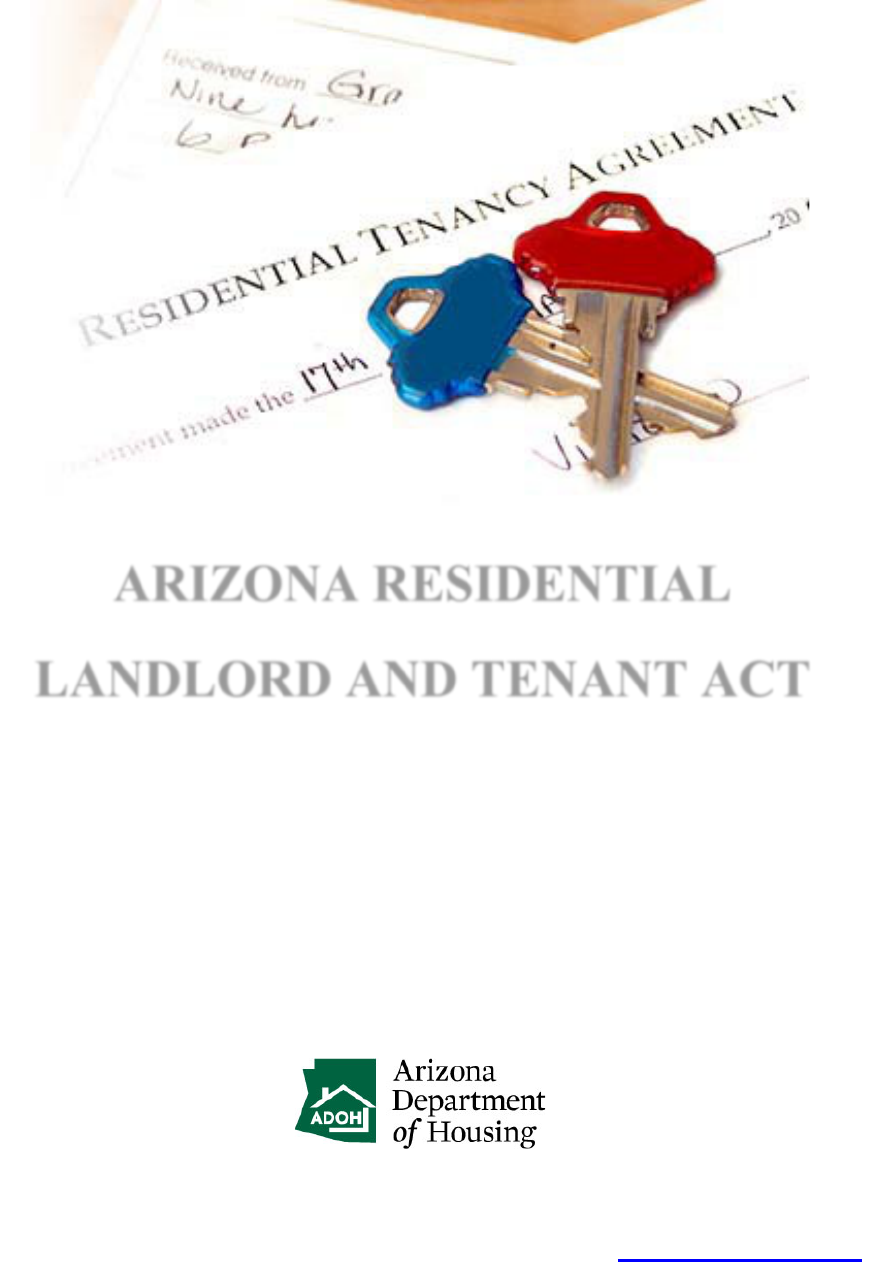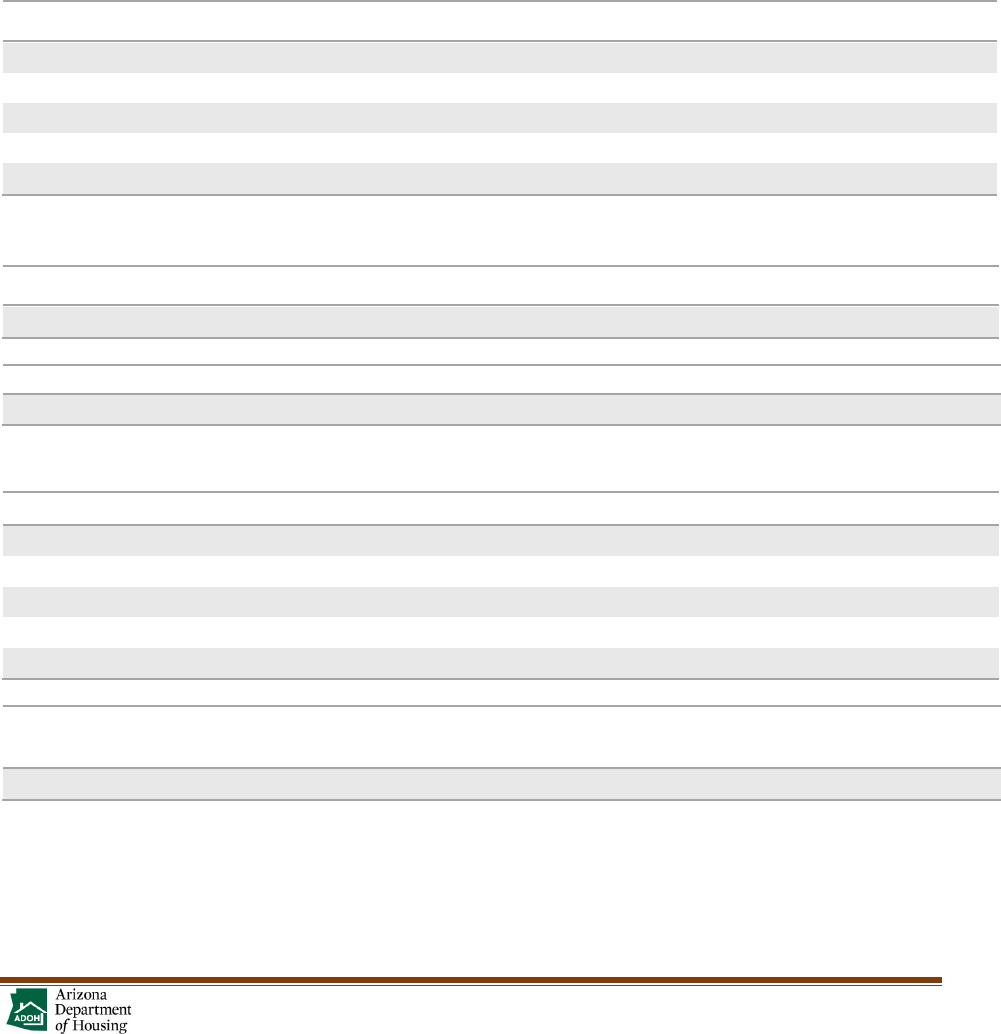
Arizona Residential Landlord and Tenant Act An Arizona Department of Housing Publication
Page 2
Table of Contents
ARIZONA RESIDENTIAL
LANDLORD AND TENANT ACT
A.R.S. Title 33, Chapter 10 and
Other Pertinent Statutes
Arizona Residential Landlord and Tenant Act
Title 33. Property, Chapter 10. Residential Landlord and Tenant Act
Page 3
Article 1. General Provisions
Page 4
Article 2. Landlord Obligations
Page 14
Article 3. Tenant Obligations
Page 18
Article 4. Remedies
Page 19
Article 5. Retaliatory Action
Page 29
Other Pertinent Statutes
Title 33. Property, Chapter 17. Residential Rental Property
Page 30
Article 1. General Provisions
Page 30
Title 9. Cities and Towns, Chapter 12. Residential Rental Inspection Programs
Page 35
Article 1. General Provisions
Page 35
Pertaining to Hotels and Innkeepers
Title 33. Property, Chapter 3. Landlord and Tenant
Page 40
Article 1. Obligations and Liabilities of Landlord
Page 40
Article 2. Obligations and Liabilities of Tenant
Page 41
Article 3. Termination of Tenancies
Page 42
Article 4. Remedies of Landlord
Page 42
Article 5. Applicability of Chapter
Page 44
Title 12. Courts and Civil Proceedings, Chapter 8. Special Actions and Proceedings Relating to
Property
Page 45
Article 4. Forcible Entry
Page 45

Arizona Residential Landlord and Tenant Act An Arizona Department of Housing Publication
Page 3
Arizona Revised Statute
Title 33 – Property
Chapter 10 – Arizona Residential Landlord and Tenant Act
Article 1 General Provisions
33-1301 Short title
33-1302 Purposes
33-1303 Supplementary principles of law applicable
33-1304 Applicability of chapter
33-1305 Administration of remedies; enforcement; notice and pleading
requirements
33-1306 Settlement of disputed claim or right
33-1307 Territorial application
33-1308 Exclusions from application of chapter
33-1310 General definitions
33-1311 Obligation of good faith
33-1312 Unconscionability
33-1313 Notice
33-1314 Terms and conditions of rental agreement; contact information;
property; pets
33-1314.01 Utility charges; submetering; ratio utility billing; allocation; water
system exemption
33-1315 Prohibited provisions in rental agreements
33-1316 Separation of rents and obligations to maintain property forbidden
33-1317 Discrimination by landlord or lessor against tenant with children
prohibited; classification; exceptions; civil remedy; applicability
33-1318 Early termination by tenant; domestic violence; sexual assault;
requirements; lock replacement; access refusal; treble damages;
immunity
33-1318.01 Early release termination for law enforcement officers; definition
33-1319 Bedbug control; landlord and tenant obligations; definitions
Article 2 Landlord Obligations
33-1321 Security deposits
33-1322 Disclosure and tender of written rental agreement
33-1323 Landlord to supply possession of dwelling unit
33-1324 Landlord to maintain fit premises
33-1325 Limitation of liability
33-1329 Regulation of rents; authority
33-1330 Transfer of records on sale
33-1331 Notice of foreclosure; effect on lease; damages
Article 3 Tenant Obligations
33-1341 Tenant to maintain dwelling unit
33-1342 Rules and regulations
33-1343 Access
33-1344 Tenant to use and occupy as a dwelling unit
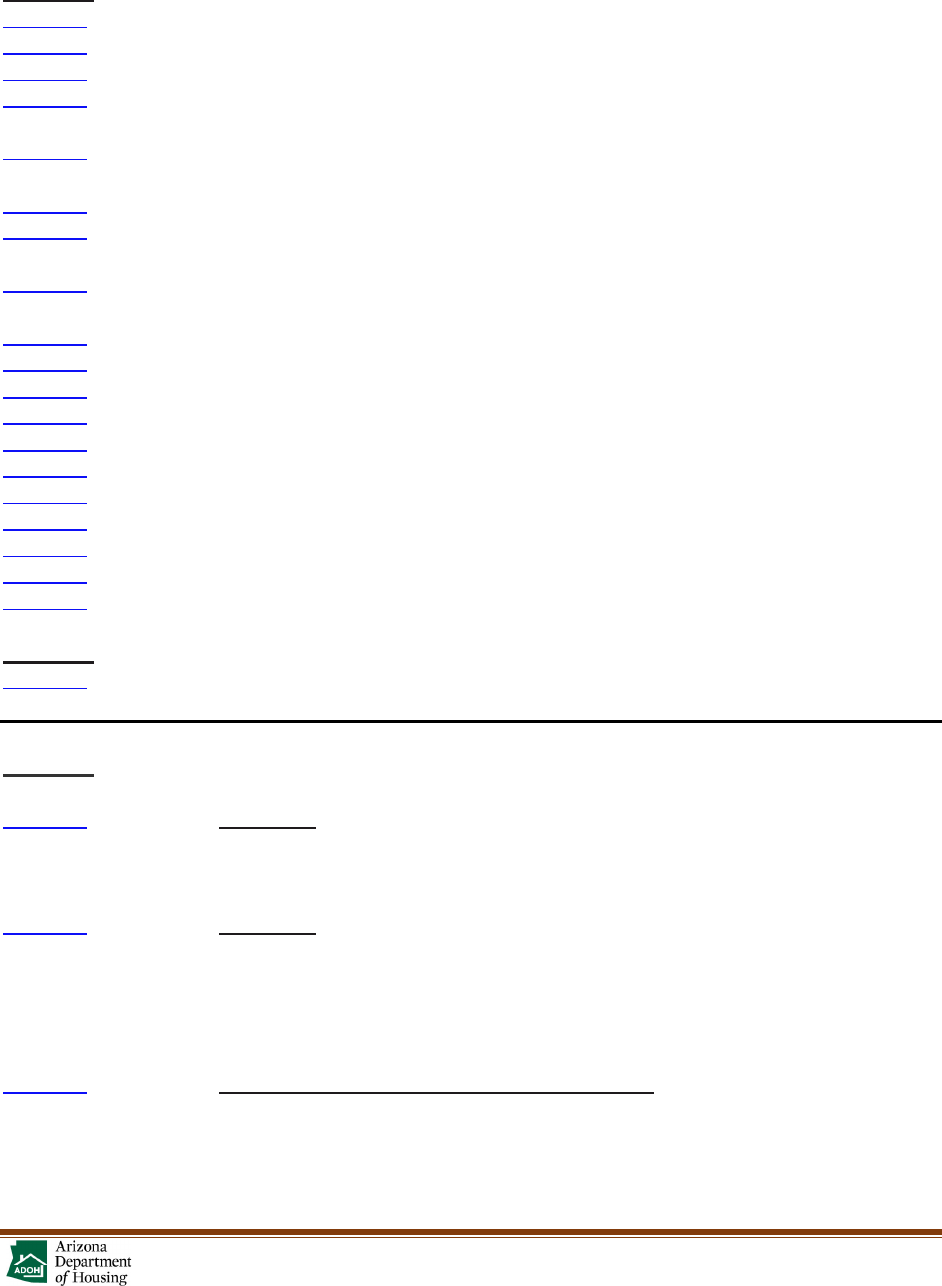
Arizona Residential Landlord and Tenant Act An Arizona Department of Housing Publication
Page 4
Article 4
Remedies
33-1361 Noncompliance by the landlord
33-1362 Failure to deliver possession
33-1363 Self-help for minor defects
33-1364 Wrongful failure to supply heat, air conditioning, cooling, water, hot
water or essential services
33-1365 Landlord's noncompliance as defense to action for possession or rent;
definition
33-1366 Fire or casualty damage
33-1367 Tenant's remedies for landlord's unlawful ouster, exclusion or
diminution of services
33-1368 Noncompliance with rental agreement by tenant; failure to pay rent;
utility discontinuation; liability for guests; definition
33-1369 Failure to maintain
33-1370 Abandonment; notice; remedies; personal property; definition
33-1371 Acceptance of partial payments; waiver of right to terminate; exception
33-1372 Landlord liens; distraint for rent
33-1373 Remedy after termination
33-1374 Recovery of possession limited
33-1375 Periodic tenancy; hold-over remedies
33-1376 Landlord and tenant remedies for abuse of access
33-1377 Special detainer actions; service; trial postponement
33-1378 Removal of guest
33-1379 Eviction action; dismissal; sealed records
Article 5
Retaliatory Action
33-1381 Retaliatory conduct prohibited
Article 1 General Provisions
33-1301
Short title
This chapter shall be known and may be cited as the Arizona residential landlord and tenant
act.
33-1302
Purposes
Underlying purposes and policies of this chapter are:
1. To simplify, clarify, modernize and revise the law governing the rental of dwelling units
and the rights and obligations of landlord and tenant.
2. To encourage landlord and tenant to maintain and improve the quality of housing.
33-1303
Supplementary principles of law applicable
Unless displaced by the provisions of this chapter, the principles of law and equity, including
the law relating to capacity to contract, mutuality of obligations, principal and agent, real
property, public health, safety and fire prevention, estoppel, fraud, misrepresentation,
duress, coercion, mistake, bankruptcy or other validating or invalidating cause supplement
its provisions.

Arizona Residential Landlord and Tenant Act An Arizona Department of Housing Publication
Page 5
33-1304
Applicability of chapter
This chapter shall apply to the rental of dwelling units. Any conflict between the provisions
of chapter 3 and chapter 7 of this title with the provisions of this chapter shall be governed
by the provisions of this chapter.
33-1305
Administration of remedies; enforcement; notice and pleading
requirements
A. The remedies provided by this chapter shall be so administered that the aggrieved party
may recover appropriate damages. The aggrieved party has a duty to mitigate damages.
B. Any right or obligation declared by this chapter is enforceable by action unless the
provision declaring it specifies a different and limited effect.
C. Notwithstanding any other law, an agency of this state and an individual court may not
adopt or enforce a rule or policy that requires a mandatory or technical form for providing
notice or for pleadings in an action for forcible entry or forcible or special detainer. The form
of any notice or pleading that meets statutory requirements for content and formatting of a
notice or pleading is sufficient to provide notice and to pursue an action for forcible entry or
forcible or special detainer.
33-1306 Settlement of disputed claim or right
A claim or right arising under this chapter or on a rental agreement, if disputed in good faith,
may be settled by agreement.
33-1307
Territorial application
This chapter applies to, regulates, and determines rights, obligations and remedies under a
rental agreement, wherever made, for a dwelling unit located within this state.
33-1308
Exclusions from application of chapter
Unless created to avoid the application of this chapter, the following arrangements are not
covered by this chapter:
1. Residence at an institution, public or private, if incidental to detention, the provision of
medical, educational, counseling or religious services or the provision of a social service
program that is provided by a social service provider. For the purposes of this paragraph,
"social service provider" means a private entity that directly assists an individual or family in
obtaining housing and that offers to provide the individual or family with assistance in
obtaining employment, child care, health care, education, skills training, transportation,
counseling or any other related service.
2. Occupancy under a contract of sale of a dwelling unit or the property of which it is a part,
if the occupant is the purchaser or a person who succeeds to his interest.
3. Occupancy by a member of a fraternal or social organization in the portion of a structure
operated for the benefit of the organization.
4. Transient occupancy in a hotel, motel or recreational lodging.
5. Occupancy by an employee of a landlord as a manager or custodian whose right to
occupancy is conditional upon employment in and about the premises.
6. Occupancy by an owner of a condominium unit or a holder of a proprietary lease in a
cooperative.
7. Occupancy in or operation of public housing as authorized, provided or conducted under
or pursuant to title 36, chapter 12, or under or pursuant to any federal law or regulation.

Arizona Residential Landlord and Tenant Act An Arizona Department of Housing Publication
Page 6
33-1310
General definitions
Subject to additional definitions contained in subsequent articles of this chapter that apply to
specific articles of this chapter, and unless the context otherwise requires, in this chapter:
1. "Action" includes recoupment, counterclaim, setoff, suit in equity and any other
proceeding in which rights are determined, including an action for possession.
2. "Building and housing codes" includes any law, ordinance or governmental regulation
concerning fitness for habitation, or the construction, maintenance, operation, occupancy,
use or appearance of any premises or dwelling unit.
3. "Delivery of possession" means returning dwelling unit keys to the landlord and vacating
the premises.
4. "Dwelling unit" means a structure or the part of a structure that is used as a home,
residence, or sleeping place by one person who maintains a household or by two or more
persons who maintain a common household. Dwelling unit does not include real property
used to accommodate a mobile home, unless the mobile home is rented or leased by the
landlord.
5. "Good faith" means honesty in fact in the conduct or transaction concerned.
6. "Housing assistance payment" means any payment made to the landlord by a
government agency, a public housing authority or any third party on behalf of a government
agency, a public housing authority or any for-profit entity pursuant to a separate written
rental assistance or subsidy contract between the landlord and the government agency,
public housing authority or third party on behalf of a government agency, public housing
authority or for-profit entity. Housing assistance payment does not include any payment
made by a faith-based organization, a community action agency program or a nonprofit
entity.
7. "Landlord" means the owner, lessor or sublessor of the dwelling unit or the building of
which it is a part, and it also means a manager of the premises who fails to disclose as
required by section 33-1322.
8. "Organization" includes a corporation, government, governmental subdivision or agency,
business trust, estate, trust, partnership or association, two or more persons having a joint
or common interest and any other legal or commercial entity that is a landlord, owner,
manager or constructive agent pursuant to section 33-1322.
9. "Owner" means one or more persons, jointly or severally, in whom is vested all or part of
the legal title to property or all or part of the beneficial ownership and a right to present use
and enjoyment of the premises. The term includes a mortgagee in possession.
10. "Person" means an individual or organization.
11. "Premises" means a dwelling unit and the structure of which it is a part and existing
facilities and appurtenances therein, including furniture and utilities where applicable, and
grounds, areas and existing facilities held out for the use of tenants generally or whose use
is promised to the tenant.
12. "Rent" means payments to be made to the landlord in full consideration for the rented
premises.
13. "Rental agreement" means all agreements, written, oral or implied by law, and valid
rules and regulations adopted under section 33-1342 embodying the terms and conditions
concerning the use and occupancy of a dwelling unit and premises.
14. "Roomer" means a person occupying a dwelling unit that lacks a major bathroom or
kitchen facility, in a structure where one or more major facilities are used in common by
occupants of the dwelling unit and other dwelling units. Major facility in the case of a
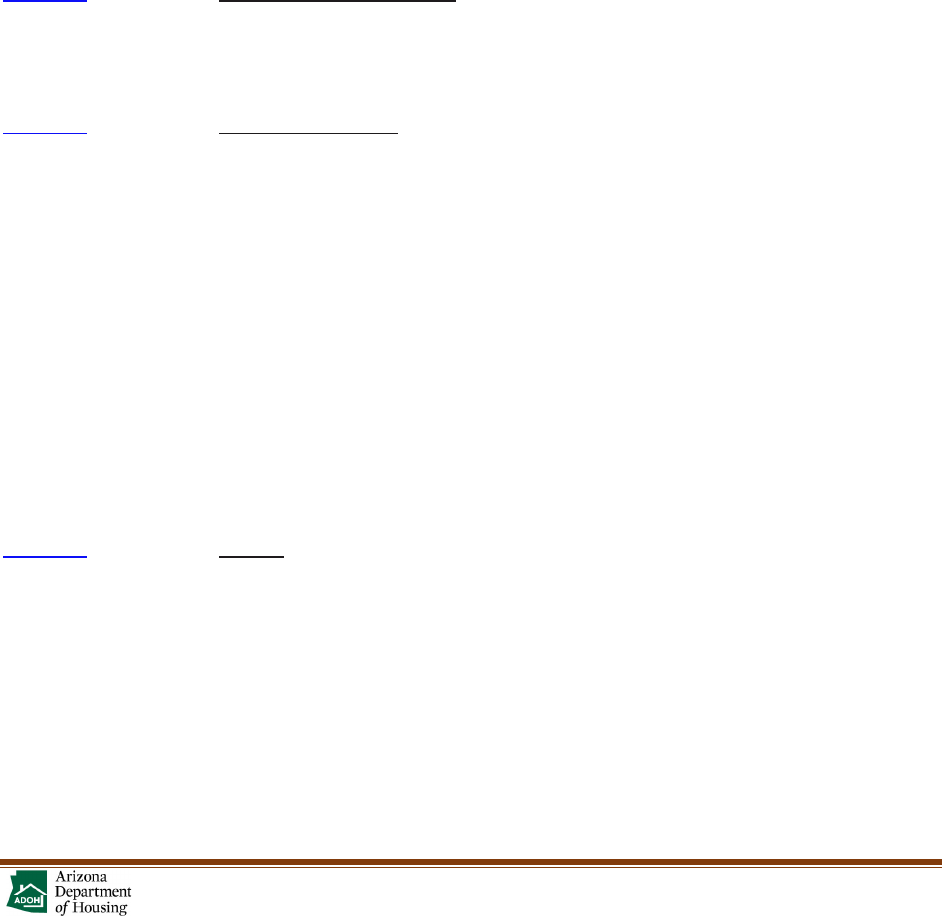
Arizona Residential Landlord and Tenant Act An Arizona Department of Housing Publication
Page 7
bathroom means toilet, or either a bath or shower, and in the case of a kitchen means
refrigerator, stove or sink.
15. "Security" means money or property given to assure payment or performance under a
rental agreement. Security does not include a reasonable charge for redecorating or
cleaning.
16. "Single family residence" means a structure maintained and used as a single dwelling
unit. Notwithstanding that a dwelling unit shares one or more walls with another dwelling
unit, it is a single family residence if it has direct access to a street or thoroughfare and does
not share heating facilities, hot water equipment or any other essential facility or service
with any other dwelling unit.
17. "Tenant" means a person entitled under a rental agreement to occupy a dwelling unit to
the exclusion of others.
18. "Term of lease" means the initial term or any renewal or extension of the written rental
agreement currently in effect not including any wrongful holdover period.
33-1311
Obligation of good faith
Every duty under this chapter and every act which must be performed as a condition
precedent to the exercise of a right or remedy under this chapter imposes an obligation of
good faith in its performance or enforcement.
33-1312
Unconscionability
A. If the court, as a matter of law, finds either of the following:
1. A rental agreement or any provision thereof was unconscionable when made, the court
may refuse to enforce the agreement, enforce the remainder of the agreement without the
unconscionable provision, or limit the application of any unconscionable provision to avoid
an unconscionable result.
2. A settlement in which a party waives or agrees to forego a claim or right under this
chapter or under a rental agreement was unconscionable at the time it was made, the court
may refuse to enforce the settlement, enforce the remainder of the settlement without the
unconscionable provision, or limit the application of any unconscionable provision to avoid
any unconscionable result.
B. If unconscionability is put into issue by a party or by the court upon its own motion the
parties shall be afforded a reasonable opportunity to present evidence as to the setting,
purpose and effect of the rental agreement or settlement to aid the court in making the
determination.
33-1313
Notice
A. A person has notice of a fact if he has actual knowledge of it, has received a notice or
notification of it or from all the facts and circumstances known to him at the time in question
he has reason to know that it exists. A person "knows" or "has knowledge" of a fact if he
has actual knowledge of it.
B. A person "notifies" or "gives" a notice or notification to another by taking steps
reasonably calculated to inform the other in ordinary course whether or not the other
actually comes to know of it. A person "receives" a notice or notification when it comes to
his attention, or in the case of the landlord, it is delivered in hand or mailed by registered or
certified mail to the place of business of the landlord through which the rental agreement
was made or at any place held out by him as the place for receipt of the communication or
delivered to any individual who is designated as an agent by section 33-1322 or, in the case

Arizona Residential Landlord and Tenant Act An Arizona Department of Housing Publication
Page 8
of the tenant, it is delivered in hand to the tenant or mailed by registered or certified mail to
him at the place held out by him as the place for receipt of the communication or, in the
absence of such designation, to his last known place of residence. If notice is mailed by
registered or certified mail, the tenant or landlord is deemed to have received such notice
on the date the notice is actually received by him or five days after the date the notice is
mailed, whichever occurs first.
C. "Notice," knowledge or a notice or notification received by an organization is effective for
a particular transaction from the time it is brought to the attention of the individual
conducting the transaction and in any event from the time it would have been brought to his
attention if the organization had exercised reasonable diligence.
33-1314
Terms and conditions of rental agreement; contact information;
property; pets
A. The landlord and tenant may include in a rental agreement terms and conditions not
prohibited by this chapter or any other rule of law including rent, term of the agreement and
other provisions governing the rights and obligations of the parties.
B. In the absence of a rental agreement, the tenant shall pay as rent the fair rental value for
the use and occupancy of the dwelling unit.
C. Rent shall be payable without demand or notice at the time and place agreed on by the
parties. Unless otherwise agreed, rent is payable at the dwelling unit and periodic rent is
payable at the beginning of any term of one month or less and otherwise in equal monthly
installments at the beginning of each month. Unless otherwise agreed, rent shall be
uniformly apportionable from day-to-day.
D. Unless the rental agreement fixes a definite term, the tenancy shall be week-to-week in
case of a roomer who pays weekly rent, and in all other cases month-to-month.
E. If a municipality that levies a transaction privilege tax on residential rent changes the
percentage of that tax, the landlord on thirty days' written notice to the tenant may adjust the
amount of rent due to equal the difference caused by the new percentage amount of the
tax. The adjustment to rent shall not occur before the date on which the new tax is effective.
In order for a landlord to adjust rent pursuant to this subsection, the landlord's right to adjust
rent pursuant to this subsection shall be disclosed in the rental agreement.
F. Notwithstanding section 14-3911, the landlord may request and the tenant may provide
and routinely update the name and contact information of a person who is authorized by the
tenant to enter the tenant's dwelling unit to retrieve and store the tenant's property including
the tenant's animal if the tenant dies or is otherwise incapacitated. If the landlord is unable
to contact the authorized person at the address and telephone number provided to the
landlord by the tenant or the authorized person fails to respond to the landlord's request
within one day for the animal or ten days for all other property after initial written contact, the
landlord may dispose of the property as prescribed in section 33-1370 or may deem the
animal abandoned, and if deemed abandoned, shall remove the animal to an animal shelter
or boarding facility as prescribed in section 33-1370, subsection E. The landlord may
release the animal to a relative of the deceased or incapacitated tenant if any of the
following applies:
1. The landlord was not provided the contact information of a person who is authorized by
the tenant to retrieve the tenant's animal.
2. The contact information is no longer valid.
3. The landlord is unable to contact the authorized person after one calendar day.

Arizona Residential Landlord and Tenant Act An Arizona Department of Housing Publication
Page 9
G. Before removing any of the tenant's personal property or the tenant's animal, the
authorized person shall present to the landlord a valid government issued identification that
confirms the identity of the authorized person. The authorized person shall have twenty
days after the date of initial written contact by the landlord or the last date for which rent is
paid, whichever is longer, to remove items from the rental property and return keys to the
landlord during regular business hours. If the landlord allows an authorized person to enter
the property to remove the tenant's personal possessions as prescribed by this subsection,
the landlord has no further liability to the tenant, the tenant's estate or the tenant's heirs for
lost, damaged or stolen items. If the tenant's personal property is not entirely removed from
the rental unit by an authorized person, the landlord may dispose of the property as
prescribed in section 33-1370.
H. Subsections F and G of this section apply only as follows:
1. To the tenant's personal property if the periodic rent is unpaid and outstanding for at least
five days.
2. To the tenant's animal if the tenant is deceased or is otherwise incapacitated.
33-1314.01
Utility charges; submetering; ratio utility billing; allocation; water
system exemption
A. A landlord may charge separately for gas, water, wastewater, solid waste removal or
electricity by installing a submetering system or by allocating the charges separately
through a ratio utility billing system.
B. If a landlord charges separately for a utility pursuant to subsection A, the landlord may
recover the charges imposed on the landlord by the utility provider plus an administrative
fee for the landlord for actual administrative costs only. The landlord shall not impose any
additional charges. The rental agreement shall contain a disclosure that lists the utility
services that are charged separately and shall specify the amount of any administrative fee
that is associated with submetering or the use of a ratio utility billing system.
C. If provided in the rental agreement, the landlord may impose a submetering system or
ratio utility billing system during the term of a rental agreement if the landlord provides
notice as prescribed by subsection G.
D. If a landlord is not in compliance with subsection B, the tenant shall first object in writing
to the landlord regarding the utility billing. If the dispute is not resolved, the tenant may file a
civil complaint in justice court to enforce this section.
E. If a landlord uses an allocation or submetering system, the bill format for each billing
period shall:
1. Separately state the cost of the charges for the period together with the opening and the
closing meter readings and the dates of the meter readings.
2. Show the amount of any administrative fee charged.
F. If a landlord does not use a submetering system and allocates charges separately for
gas, water, wastewater, solid waste removal or electricity, the landlord may allocate the
costs to each tenant by using one or more of the following ratio utility billing system
methods:
1. Per tenant.
2. Proportionately by livable square footage.
3. Per type of unit.
4. Per number of water fixtures.
5. For water and wastewater, by use of an individually submetered hot water usage
measure for the tenant's dwelling unit.

Arizona Residential Landlord and Tenant Act An Arizona Department of Housing Publication
Page 10
6. Any other method that fairly allocates the charges and that is described in the tenant's
rental agreement.
G. If a landlord uses a ratio utility billing system method pursuant to subsection F, the rental
agreement shall contain a specific description of the ratio utility billing method used to
allocate utility costs. For any existing tenancies, the landlord shall provide at least ninety
days' notice to the tenant before the landlord begins using a submetering system or
allocating costs through a ratio utility billing system.
H. For purposes of regulating apartment communities as public or consecutive water
systems, the department of environmental quality shall not adopt rules pursuant to title 49,
chapter 2, article 9 that are more stringent than those authorized by federal law. Without
other evidence of activities that are subject to regulation under title 49, chapter 2, article 9,
the department of environmental quality shall not use an apartment community's use of a
submetering system or a ratio utility billing system as the sole basis for regulating an
apartment community as a public or consecutive water system.
33-1315
Prohibited provisions in rental agreements
A. A rental agreement shall not provide that the tenant does any of the following:
1. Agrees to waive or to forego rights or remedies under this chapter.
2. Agrees to pay the landlord's attorney fees, except an agreement in writing may provide
that attorney fees may be awarded to the prevailing party in the event of court action and
except that a prevailing party in a contested forcible detainer action is eligible to be awarded
attorney fees pursuant to section 12-341.01 regardless of whether the rental agreement
provides for such an award.
3. Agrees to the exculpation or limitation of any liability of the landlord arising under law or
to indemnify the landlord for that liability or the costs connected therewith.
4. Agrees to waive or limit the tenant's right to summon or any other person's right to
summon a peace officer or other emergency assistance in response to an emergency.
5. Agrees to payment of monetary penalties or otherwise penalizes the tenant for the tenant
summoning or for any other person summoning a peace officer or other emergency
assistance in response to an emergency.
B. A provision that is prohibited by subsection A of this section and that is included in a
rental agreement is unenforceable. If a landlord deliberately uses a rental agreement
containing provisions known by the landlord to be prohibited, the tenant may recover actual
damages sustained by the tenant and not more than two months' periodic rent.
C. This section does not limit the landlord's right to evict a tenant pursuant to section 33-
1368.
33-1316
Separation of rents and obligations to maintain property forbidden
A rental agreement, assignment, conveyance, trust deed or security instrument may not
permit the receipt of rent free of the obligation to comply with section 33-1324, subsection
A.
33-1317
Discrimination by landlord or lessor against tenant with children
prohibited; classification; exceptions; civil remedy; applicability
A. A person who knowingly refuses to rent to any other person a place to be used for a
dwelling for the reason that the other person has a child or children, or who advertises in
connection with the rental a restriction against children, either by the display of a sign,

Arizona Residential Landlord and Tenant Act An Arizona Department of Housing Publication
Page 11
placard or written or printed notice, or by publication thereof in a newspaper of general
circulation, is guilty of a petty offense.
B. No person shall rent or lease his property to another in violation of a valid restrictive
covenant against the sale of such property to persons who have a child or children living
with them.
C. No person shall rent or lease his property to persons who have a child or children living
with them when his property meets the definition of housing for older persons in section 41-
1491.04.
D. A person who knowingly rents or leases his property in violation of the provisions of
subsection B or C of this section is guilty of a petty offense.
E. A person whose rights under this section have been violated may bring a civil action
against a person who violates this section for all of the following:
1. Injunctive or declaratory relief to correct the violation.
2. Actual damages sustained by the tenant or prospective tenant.
3. A civil penalty of three times the monthly rent of the housing accommodation involved in
the violation if the violation is determined to be intentional.
4. Court costs and reasonable attorney fees.
F. Nothing in this section shall prohibit a person from refusing to rent a dwelling by reason
of reasonable occupancy standards established by the owner or the owner's agent which
apply to persons of all ages, and which have been adopted and published before the event
in issue. An occupancy limitation of two persons per bedroom residing in a dwelling unit
shall be presumed reasonable for this state and all political subdivisions of this state.
G. Subsection B of this section applies only to dwellings occupied or intended to be
occupied by no more than four families living independently of each other and in which the
owner maintains and occupies one of the living quarters as the owner's residence.
33-1318
Early termination by tenant; domestic violence; sexual assault;
requirements; lock replacement; access refusal; treble damages;
immunity
A. A tenant may terminate a rental agreement pursuant to this section if the tenant provides
to the landlord written notice pursuant to this section that the tenant is the victim of domestic
violence as defined in section 13-3601 or was the victim, in the tenant's dwelling, of sexual
assault pursuant to section 13-1406. The tenant's rights and obligations under the rental
agreement are terminated and the tenant shall vacate the dwelling and avoid liability for
future rent and shall not incur early termination penalties or fees if the tenant provides to the
landlord a written notice requesting release from the rental agreement with a mutually
agreed on release date within the next thirty days, accompanied by any one of the following:
1. A copy of any protective order issued pursuant to section 13-3602 to a tenant who is a
victim of domestic violence or sexual assault. A landlord may also request a receipt or
signed statement that the order of protection has been submitted to an authorized officer of
a court for service.
2. A copy of a written departmental report from a law enforcement agency that states that
the tenant notified the law enforcement agency that the tenant was a victim of domestic
violence or sexual assault.
B. A landlord may request from the victim the name and address of the person named in an
order of protection or a departmental report pursuant to subsection A of this section, in
writing, if known by the victim.

Arizona Residential Landlord and Tenant Act An Arizona Department of Housing Publication
Page 12
C. The tenant may terminate the rental agreement pursuant to this section only if the
actions, events or circumstances that resulted in the tenant being a victim of domestic
violence as defined in section 13-3601 or sexual assault pursuant to section 13-1406
occurred within the thirty-day period immediately preceding the written notice of termination
to the landlord, unless waived by the landlord.
D. If the tenant terminates the rental agreement as prescribed by this section and if the
tenant is solely or jointly liable on the rental agreement, the tenant is liable only for rent
owed or paid through the date of the lease termination plus any previous obligations
outstanding on that date. The amount due from the tenant shall be paid to the landlord on
or before the date the tenant vacates the dwelling. If the tenant has prepaid rent that would
apply for the month in which the lease is terminated, the landlord may retain the prepaid
rent and no refund is due to the tenant. If the tenant has paid a security deposit pursuant to
section 33-1321, the landlord shall not withhold the security deposit for the early termination
of the lease if the tenant meets the requirements prescribed by subsection A of this section,
but may withhold the security deposit for payment of damages that the landlord suffered by
reason of the tenant's noncompliance with section 33-1341.
E. A tenant who is a victim of domestic violence or sexual assault may require the landlord
to install a new lock to the tenant's dwelling if the tenant pays for the cost of installing the
new lock. A landlord may comply with this requirement by doing either of the following:
1. Rekeying the lock if the lock is in good working condition.
2. Replacing the entire locking mechanism with a locking mechanism of equal or better
quality than the lock being replaced.
F. A landlord who installs a new lock at the tenant's request may retain a copy of the key
that opens the new lock. Notwithstanding any provision in the rental agreement, the landlord
may refuse to provide a key that opens the new lock to the person named in an order of
protection or a departmental report pursuant to subsection A of this section.
G. A landlord shall refuse to provide access to the dwelling to reclaim property to any tenant
if the tenant is the person named in an order of protection or a departmental report pursuant
to subsection A of this section who has been served with an order of protection naming that
tenant as the defendant and the landlord has received a copy of the order of protection,
unless a law enforcement officer escorts the tenant into and out of the dwelling.
H. A tenant who terminates a lease pursuant to this section and who is convicted of falsely
filing a departmental report or order of protection for domestic violence or sexual assault is
liable to the landlord for treble damages for premature termination of the lease.
I. A person named in an order of protection or a departmental report pursuant to subsection
A of this section who provokes an early lease termination under this section is deemed to
have interfered with the residential rental agreement between the landlord and tenant
regardless of whether the person named in an order of protection or a departmental report
pursuant to subsection A of this section is a party to the rental agreement, and the person
named in an order of protection or a departmental report pursuant to subsection A of this
section may be civilly liable for all economic losses incurred by a landlord for the domestic
violence or sexual assault early lease termination. This civil liability includes unpaid rent,
early lease termination fees, costs to repair damage to the premises and any reductions or
waivers of rent previously granted to the tenant who was the victim of domestic violence or
sexual assault.
J. If there are multiple tenants who are parties to a rental agreement that has been
terminated under this section, the tenancy for those tenants also terminates. The tenants
who are not the victims of domestic violence or sexual assault, excluding the person named
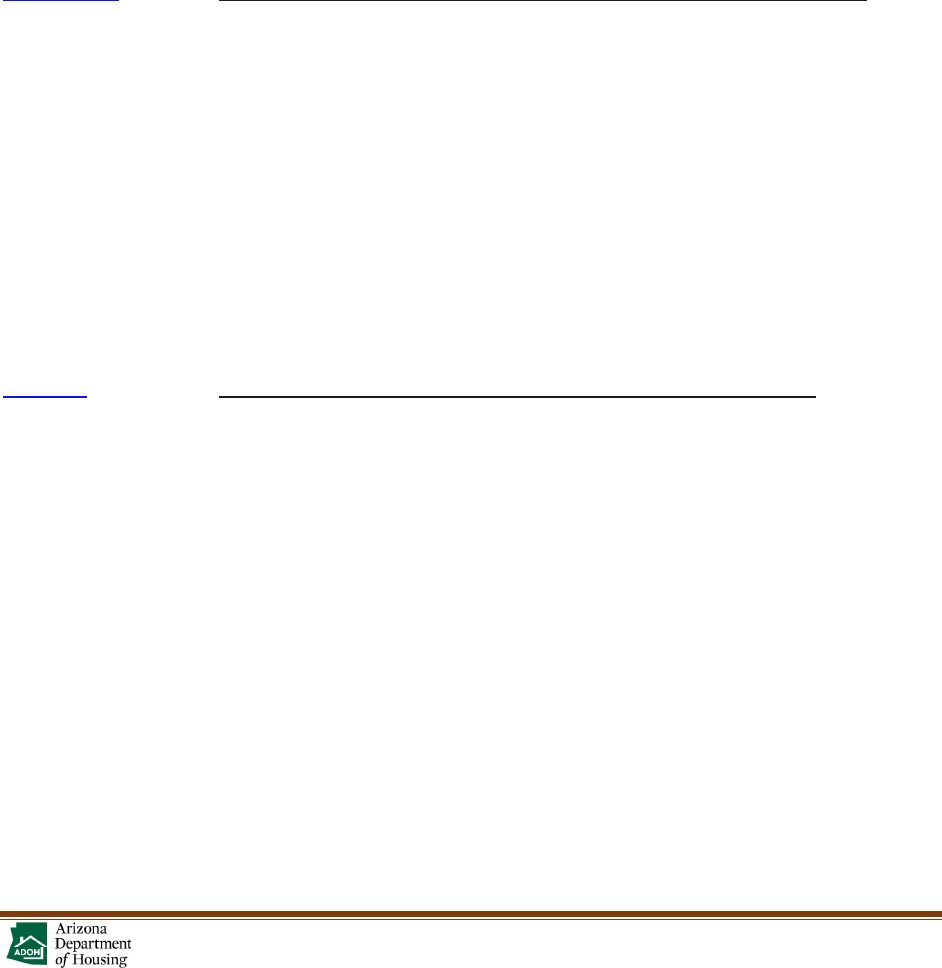
Arizona Residential Landlord and Tenant Act An Arizona Department of Housing Publication
Page 13
in an order of protection or a departmental report pursuant to subsection A of this section
that caused the termination of the lease pursuant to this section, may be released from any
financial obligations due under the previously existing rental agreement and the remaining
tenants may be allowed to enter into a new lease with the landlord if the tenants meet all
current application requirements.
K. An emergency order of protection or a protective order that is issued to a resident of a
rental property automatically applies to the entire residential rental property in which the
tenant has a rental agreement.
L. This section does not limit a landlord's right to terminate a lease pursuant to section 33-
1368 against the victim for actions unrelated to the act of domestic violence or sexual
assault.
M. A landlord is not liable for any actions taken in good faith pursuant to this section.
33-1318.01
Early release termination for law enforcement officers; definition
A. A law enforcement officer may terminate a rental agreement in the same manner
established in section 33-1318 if the law enforcement officer provides to the landlord a
written notice that the law enforcement officer is protected under an injunction against
harassment issued pursuant to section 12-1809 and the injunction against harassment was
issued within the thirty-day period immediately preceding lawful notice to the landlord,
unless waived by the landlord.
B. If the law enforcement officer received any lease concession or benefit, the concession
or benefit actually received or used shall be repaid to the landlord before vacating the
dwelling.
C. All other rights, remedies and obligations provided in section 33-1318 apply to the
landlord and the law enforcement officer.
D. For the purposes of this section, "law enforcement officer" has the same meaning
prescribed in section 38-1101.
33-1319
Bedbug control; landlord and tenant obligations; definitions
A. A landlord has the following obligations with respect to a bedbug infestation:
1. The landlord shall provide bedbug educational materials to existing and new
tenants. Educational materials may include:
(a) A description of measures that may be taken to prevent and control bedbugs.
(b) Information about bedbugs, including a description of their appearance.
(c) A description of behaviors that are risk factors for attracting bedbugs such as purchasing
renovated mattresses, using discarded mattresses and furniture, using used or leased
furniture, purchasing pre-owned clothing and traveling without proper precautions.
(d) Information provided by the United States centers for disease control and prevention
and other federal, state or local health agencies.
(e) Information provided by federal, state or local housing agencies.
(f) Information provided by nonprofit housing organizations.
(g) Information developed by the landlord.
2. The landlord shall not enter into any lease agreement with a tenant for a dwelling unit that
the landlord knows to have a current bedbug infestation.
B. A tenant has the following obligations with respect to a bedbug infestation:
1. The tenant shall not knowingly move materials into a dwelling unit that are infested with
bedbugs.

Arizona Residential Landlord and Tenant Act An Arizona Department of Housing Publication
Page 14
2. A tenant who knows of the presence of bedbugs shall provide the landlord written or
electronic notification of the presence of bedbugs.
C. This section does not limit any other rights, remedies and obligations under this chapter.
D. The landlord and tenant of a single family residence are excluded from the provisions of
this section.
E. Except as specifically provided in this section, this section does not create a cause of
action against:
1. A landlord or a landlord's employees, officers, agents and directors by a tenant or a
tenant's guests for any damages caused by bedbugs.
2. A tenant by a landlord for any damages caused by bedbugs.
F. For the purposes of this section:
1. "Bedbugs" means any insect in the genus cimex and its eggs.
2. "Infestation" or "infested" means that the presence of bedbugs is sufficient to materially
affect the health and safety of tenants and their guests.
Article 2
Landlord Obligations
33-1321
Security deposits
A. A landlord shall not demand or receive security, however denominated, including prepaid
rent in an amount or value of more than one and one-half month's rent. This subsection
does not prohibit a tenant from voluntarily paying more than one and one-half month's rent
in advance.
B. The purpose of all nonrefundable fees or deposits shall be stated in writing by the
landlord. Any fee or deposit not designated as nonrefundable is refundable.
C. On move in, a landlord shall furnish the tenant with a signed copy of the lease, a move-in
form for specifying any existing damages to the dwelling unit and written notification to the
tenant that the tenant may be present at the move-out inspection. On request by the tenant,
the landlord shall notify the tenant when the landlord's move-out inspection will occur. If the
tenant is being evicted for a material and irreparable breach and the landlord has
reasonable cause to fear violence or intimidation on the part of the tenant, the landlord has
no obligation to conduct a joint move-out inspection with the tenant.
D. On termination of the tenancy, property or money held by the landlord as prepaid rent
and security may be applied to the payment of all rent, and subject to a landlord's duty to
mitigate, all charges as specified in the signed lease agreement, or as provided in this
chapter, including the amount of damages which the landlord has suffered by reason of the
tenant's noncompliance with section 33-1341. Within fourteen days, excluding Saturdays,
Sundays or other legal holidays, after termination of the tenancy and delivery of possession
and demand by the tenant the landlord shall provide the tenant an itemized list of all
deductions together with the amount due and payable to the tenant, if any. Unless other
arrangements are made in writing by the tenant, the landlord shall mail the itemized list and
any amount due, by first class mail, to the tenant's last known place of residence. If the
tenant does not dispute the deductions or the amount due and payable to the tenant within
sixty days after the itemized list and amount due are mailed as prescribed by this
subsection, the amount due to the tenant as set forth in the itemized list with any amount
due is deemed valid and final and any further claims of the tenant are waived.

Arizona Residential Landlord and Tenant Act An Arizona Department of Housing Publication
Page 15
E. If the landlord fails to comply with subsection D of this section, the tenant may recover
the property and money due the tenant together with damages in an amount equal to twice
the amount wrongfully withheld.
F. This section does not preclude the landlord or tenant from recovering other damages to
which the landlord or tenant may be entitled under this chapter.
G. During the term of tenancy the landlord may use refundable security deposits or other
refundable deposits in accordance with any applicable provisions of the property
management agreement. At the end of tenancy, all refundable deposits shall be refunded
to the tenant pursuant to this section.
H. The holder of the landlord's interest in the premises at the time of the termination of the
tenancy is bound by this section.
33-1322
Disclosure and tender of written rental agreement
A. The landlord or any person authorized to enter into a rental agreement on his behalf shall
disclose to the tenant in writing at or before the commencement of the tenancy the name
and address of each of the following:
1. The person authorized to manage the premises.
2. An owner of the premises or a person authorized to act for and on behalf of the owner for
the purpose of service of process and for the purpose of receiving and receipting for notices
and demands.
B. At or before the commencement of the tenancy, the landlord shall inform the tenant in
writing that the Arizona residential landlord and tenant act is available on the Arizona
department of housing's website.
C. The information required to be furnished by this section shall be kept current and
refurnished to a tenant upon the tenant's request. This section extends to and is
enforceable against any successor landlord, owner or manager.
D. A person who fails to comply with subsections A, B and C becomes an agent of each
person who is a landlord for the following purposes:
1. Service of process and receiving and receipting for notices and demands.
2. Performing the obligations of the landlord under this chapter and under the rental
agreement and expending or making available for the purpose all rent collected from the
premises.
E. If there is a written rental agreement, the landlord must tender and deliver a signed copy
of the rental agreement to the tenant and the tenant must sign and deliver to the landlord
one fully executed copy of such rental agreement within a reasonable time after the
agreement is executed. A written rental agreement shall have all blank spaces
completed. Noncompliance with this subsection shall be deemed a material noncompliance
by the landlord or the tenant, as the case may be, of the rental agreement.
33-1323
Landlord to supply possession of dwelling unit
At the commencement of the term the landlord shall deliver possession of the premises to
the tenant in compliance with the rental agreement and section 33-1324. The landlord may
bring an action for possession against any person wrongfully in possession and may
recover the damages provided in section 33-1375, subsection C.

Arizona Residential Landlord and Tenant Act An Arizona Department of Housing Publication
Page 16
33-1324 Landlord to maintain fit premises
A. The landlord shall:
1. Comply with the requirements of applicable building codes materially affecting health and
safety as prescribed in section 9-1303.
2. Make all repairs and do whatever is necessary to put and keep the premises in a fit and
habitable condition.
3. Keep all common areas of the premises in a clean and safe condition.
4. Maintain in good and safe working order and condition all electrical, plumbing, sanitary,
heating, ventilating, air-conditioning and other facilities and appliances, including elevators,
supplied or required to be supplied by him.
5. Provide and maintain appropriate receptacles and conveniences for the removal of
ashes, garbage, rubbish and other waste incidental to the occupancy of the dwelling unit
and arrange for their removal.
6. Supply running water and reasonable amounts of hot water at all times, reasonable heat
and reasonable air-conditioning or cooling where such units are installed and offered, when
required by seasonal weather conditions, except where the building that includes the
dwelling unit is not required by law to be equipped for that purpose or the dwelling unit is so
constructed that heat, air-conditioning, cooling or hot water is generated by an installation
within the exclusive control of the tenant and supplied by a direct public utility connection.
B. If the duty imposed by subsection A, paragraph 1 of this section is greater than any duty
imposed by any other paragraph of this section, the landlord's duty shall be determined by
reference to that paragraph.
C. The landlord and tenant of a single family residence may agree in writing, supported by
adequate consideration, that the tenant perform the landlord's duties specified in subsection
A, paragraphs 5 and 6 of this section, and also specified repairs, maintenance tasks,
alterations and remodeling, but only if the transaction is entered into in good faith, not for
the purpose of evading the obligations of the landlord and the work is not necessary to cure
noncompliance with subsection A, paragraphs 1 and 2 of this section.
D. The landlord and tenant of any dwelling unit other than a single family residence may
agree that the tenant is to perform specified repairs, maintenance tasks, alterations or
remodeling only if:
1. The agreement of the parties is entered into in good faith and not for the purpose of
evading the obligations of the landlord and is set forth in a separate writing signed by the
parties and supported by adequate consideration.
2. The work is not necessary to cure noncompliance with subsection A, paragraphs 1 and 2
of this section.
3. The agreement does not diminish or affect the obligation of the landlord to other tenants
in the premises.
33-1325
Limitation of liability
A. Unless otherwise agreed, a landlord, who conveys premises that include a dwelling unit
subject to a rental agreement in a good faith sale to a bona fide purchaser, is relieved of
liability under the rental agreement and this chapter as to events occurring subsequent to
written notice to the tenant of the conveyance. He remains liable to the tenant for any
property and money to which the tenant is entitled under section 33-1321.
B. Unless otherwise agreed, a manager of premises that include a dwelling unit is relieved
of liability under the rental agreement and this chapter as to events occurring after written
notice to the tenant of the termination of his management.

Arizona Residential Landlord and Tenant Act An Arizona Department of Housing Publication
Page 17
33-1329
Regulation of rents; authority
A. Notwithstanding any other provisions of law to the contrary the state legislature
determines that the imposition of rent control on private residential housing units by cities,
including charter cities, and towns is of statewide concern. Therefore, the power to control
rents on private residential property is preempted by the state. Cities, including charter
cities, or towns shall not have the power to control rents.
B. The provisions of subsection A shall not apply to residential property which is owned,
financed, insured or subsidized by any state agency, or by any city, including charter city, or
town.
33-1330
Transfer of records on sale
On the sale or other transfer of an apartment community as defined in section 40-360.21,
the landlord shall deliver to the buyer or other transferee all available plans, drawings and
records pertaining to the location of all underground facilities in the property, all plans,
drawings, surveys and plats of the property, all records pertaining to tenant security
deposits and complete files for each tenant of the property at closing containing rental
agreements and all other documents and disclosures required by this chapter that are in the
possession of the landlord. A landlord who fails to deliver reasonably accurate and
maintained installation records of active, inactive and abandoned underground facilities
installed after December 31, 2006 is liable for all damages proximately caused by the
failure, including all expenses incurred by successor landlords to create such installation
records.
33-1331
Notice of foreclosure; effect on lease; damages
A. If a rental agreement is entered into after the foreclosure action was initiated, the owner
shall include written notice of possible foreclosure with the rental agreement with the tenant.
The notice shall include a statement that is substantially in the following form:
This property is undergoing foreclosure. For more information on this action, you should
contact ________________ (name, address and phone number of the court where the
action is filed or trustee, attorney or other responsible party).
A sale at auction may or may not occur as a result of this foreclosure. Currently, the sale of
this property has been set for _________ (time, date and place) or no date for sale of this
property has been established.
B. If the owner receives a notice of trustee's sale or other notice of foreclosure on the
property after a tenant has entered into a rental agreement on the property, the owner shall
provide the tenant with written notice as prescribed in subsection A of this section within five
business days after receipt of the notice of trustee's sale. This subsection applies only to
the first notice of trustee's sale or the first notice of foreclosure received by the owner after
the tenant has entered into the rental agreement.
C. If the owner fails to provide notice as prescribed in this section the tenant may deliver a
written notice pursuant to section 33-1361 and recover damages and obtain injunctive
relief. The security deposit shall be returned to the tenant as prescribed in section 33-1321.
D. This section shall not apply to multifamily residential rental units consisting of four or
more connected units.

Arizona Residential Landlord and Tenant Act An Arizona Department of Housing Publication
Page 18
Article 3 Tenant Obligations
33-1341
Tenant to maintain dwelling unit
The tenant shall:
1. Comply with all obligations primarily imposed upon tenants by applicable provisions of
building codes materially affecting health and safety.
2. Keep that part of the premises that he occupies and uses as clean and safe as the
condition of the premises permit.
3. Dispose from his dwelling unit all ashes, rubbish, garbage and other waste in a clean and
safe manner.
4. Keep all plumbing fixtures in the dwelling unit or used by the tenant as clean as their
condition permits.
5. Use in a reasonable manner all electrical, plumbing, sanitary, heating, ventilating, air-
conditioning and other facilities and appliances including elevators in the premises.
6. Not deliberately or negligently destroy, deface, damage, impair or remove any part of the
premises or knowingly permit any person to do so.
7. Conduct himself and require other persons on the premises with his consent to conduct
themselves in a manner that will not disturb his neighbors' peaceful enjoyment of the
premises.
8. Promptly notify the landlord in writing of any situation or occurrence that requires the
landlord to provide maintenance or make repairs or otherwise requires the landlord to take
action as prescribed in section 33-1324.
33-1342
Rules and regulations
A. A landlord, from time to time, may adopt rules or regulations, however described,
concerning the tenant's use and occupancy of the premises. Such rules or regulations are
enforceable against the tenant only if:
1. Their purpose is to promote the convenience, safety or welfare of the tenants in the
premises, preserve the landlord's property from abusive use or make a fair distribution of
services and facilities held out for the tenants generally.
2. They are reasonably related to the purpose for which adopted.
3. They apply to all tenants in the premises in a fair manner.
4. They are sufficiently explicit in prohibition, direction or limitation of the tenant's conduct to
fairly inform the tenant of what the tenant must or must not do to comply.
5. They are not for the purpose of evading the obligations of the landlord.
6. The tenant has notice of them at the time the tenant enters into the rental agreement.
B. A rule or regulation adopted after the tenant enters into the rental agreement is
enforceable against the tenant if a thirty day notice of its adoption is given to the tenant and
it does not constitute a substantial modification of the tenant's rental agreement.
C. If state, county, municipal or other governmental bodies adopt new ordinances, rules or
other legal provisions affecting existing rental agreements, the landlord may make
immediate amendments to lease agreements to bring them into compliance with the law.
The landlord shall give a tenant written notice that the tenant's lease agreement has been
amended, and the notice shall provide a brief description of the amendment and the
effective date.

Arizona Residential Landlord and Tenant Act An Arizona Department of Housing Publication
Page 19
33-1343 Access
A. The tenant shall not unreasonably withhold consent to the landlord to enter into the
dwelling unit in order to inspect the premises, make necessary or agreed repairs,
decorations, alterations or improvements, supply necessary or agreed services or exhibit
the dwelling unit to prospective or actual purchasers, mortgagees, tenants, workmen or
contractors.
B. If the tenant notifies the landlord of a service request or a request for maintenance as
prescribed in section 33-1341, paragraph 8, the notice from the tenant constitutes
permission from the tenant for the landlord to enter the dwelling unit pursuant to subsection
D of this section for the sole purpose of acting on the service or maintenance request and
the tenant waives receipt of any separate or additional access notice that may be required
pursuant to subsection D of this section.
C. The landlord may enter the dwelling unit without consent of the tenant in case of
emergency.
D. The landlord shall not abuse the right to access or use it to harass the tenant. Except in
case of emergency or if it is impracticable to do so, the landlord shall give the tenant at least
two days' notice of the landlord’s intent to enter and enter only at reasonable times.
E. The landlord has no other right of access except by court order and as permitted by
sections 33-1369 and 33-1370, or if the tenant has abandoned or surrendered the
premises.
33-1344
Tenant to use and occupy as a dwelling unit
Unless otherwise agreed, the tenant shall occupy his dwelling unit only as a dwelling unit.
Article 4
Remedies
33-1361
Noncompliance by the landlord
A. Except as provided in this chapter, if there is a material noncompliance by the landlord
with the rental agreement, including a material falsification of the written information
provided to the tenant, the tenant may deliver a written notice to the landlord specifying the
acts and omissions constituting the breach and that the rental agreement will terminate
upon a date not less than ten days after receipt of the notice if the breach is not remedied in
ten days. If there is a noncompliance by the landlord with section 33-1324 materially
affecting health and safety, the tenant may deliver a written notice to the landlord specifying
the acts and omissions constituting the breach and that the rental agreement will terminate
upon a date not less than five days after receipt of the notice if the breach is not remedied in
five days. For the purposes of this section, material falsification includes false information
relating to availability of the unit, except when a holdover tenant is in illegal possession or in
violation of the rental agreement, the condition of the premises and any current services as
represented by the landlord in writing and any representation regarding future services and
any future changes regarding the condition of the premises, the provision of utility services
and the designation of the party responsible for the payment of utility services. The rental
agreement shall terminate and the dwelling unit shall be vacated as provided in the notice
subject to the following:
1. If the breach is remediable by repairs or the payment of damages or otherwise and the
landlord adequately remedies the breach prior to the date specified in the notice, the rental
agreement will not terminate.

Arizona Residential Landlord and Tenant Act An Arizona Department of Housing Publication
Page 20
2. The tenant may not terminate for a condition caused by the deliberate or negligent act or
omission of the tenant, a member of the tenant's family or other person on the premises
with the tenant's consent.
B. Except as provided in this chapter, the tenant may recover damages and obtain
injunctive relief for any noncompliance by the landlord with the rental agreement or with
section 33-1318 or 33-1324.
C. The remedy provided in subsection B of this section is in addition to any right of the
tenant arising under subsection A of this section.
D. If the rental agreement is terminated, the landlord shall return all security recoverable by
the tenant under section 33-1321.
33-1362
Failure to deliver possession
A. If the landlord fails to deliver physical possession of the dwelling unit to the tenant as
provided in section 33-1323, rent abates until possession is delivered and the tenant may
do either of the following:
1. Upon at least five days' written notice to the landlord terminate the rental agreement and
upon termination the landlord shall return all prepaid rent and security.
2. Demand performance of the rental agreement by the landlord and, if the tenant elects,
maintain an action for possession of the dwelling unit against the landlord or any person
wrongfully in possession and recover the damages sustained by him.
B. If the landlord fails to deliver constructive possession to the tenant because of
noncompliance with section 33-1324, rent shall not abate. Tenant may proceed with the
remedies provided for in section 33-1361.
C. If a person's failure to deliver possession is willful and not in good faith, an aggrieved
person may recover from that person an amount not more than two months' periodic rent or
twice the actual damages sustained by him, whichever is greater.
33-1363
Self-help for minor defects
A. If the landlord fails to comply with section 33-1324, and the reasonable cost of
compliance is less than three hundred dollars, or an amount equal to one-half of the
monthly rent, whichever amount is greater, the tenant may recover damages for the breach
under section 33-1361, subsection B, or may notify the landlord of the tenant's intention to
correct the condition at the landlord's expense. After being notified by the tenant in writing, if
the landlord fails to comply within ten days or as promptly thereafter as conditions require in
case of emergency, the tenant may cause the work to be done by a licensed contractor and,
after submitting to the landlord an itemized statement and a waiver of lien, deduct from his
rent the actual and reasonable cost of the work, not exceeding the amount specified in this
subsection.
B. A tenant may not repair at the landlord's expense if the condition was caused by the
deliberate or negligent act or omission of the tenant, a member of the tenant's family or
other person on the premises with the tenant's consent or if the condition repaired does not
constitute a breach of the fit and habitable condition of the premises.
33-1364
Wrongful failure to supply heat, air conditioning, cooling, water, hot
water or essential services
A. If contrary to the rental agreement or section 33-1324 the landlord deliberately or
negligently fails to supply running water, gas or electrical service, or both if applicable, and
reasonable amounts of hot water or heat, air-conditioning or cooling, where such units are

Arizona Residential Landlord and Tenant Act An Arizona Department of Housing Publication
Page 21
installed and offered, or essential services, the tenant may give reasonable notice to the
landlord specifying the breach and may do one of the following:
1. Procure reasonable amounts of hot water, running water, heat and essential services
during the period of the landlord's noncompliance and deduct their actual reasonable cost
from the rent. If the landlord has failed to provide any of the utility services specified in this
section due to nonpayment of the landlord's utility bill for the premises, and if there is no
separate utility meter for each tenant in the premises such that the tenant could avoid a
utility shutoff by arranging to have services transferred to the tenant's name, the tenant may
either individually or collectively with other tenants arrange with the utility company to pay
the utility bill after written notice to the landlord of the tenant's intent to do so. With the utility
company's approval the tenant or tenants may pay the landlord's delinquent utility bill and
deduct from any rent owed to the landlord the actual cost of the payment the tenant made to
restore utility services. The tenant or tenants may continue to make such payments to the
utility company until the landlord has provided adequate assurances to the tenant that the
above utility services will be maintained.
2. Recover damages based upon the diminution in the fair rental value of the dwelling unit.
3. Procure reasonable substitute housing during the period of the landlord's noncompliance,
in which case the tenant is excused from paying rent for the period of the landlord's
noncompliance. In the event the periodic cost of such substitute housing exceeds the
amount of the periodic rent, upon delivery by tenant of proof of payment for such substitute
housing, tenant may recover from landlord such excess costs up to an amount not to
exceed twenty-five per cent of the periodic rent which has been excused pursuant to this
paragraph.
B. A landlord shall provide all utilities and services specified in the lease agreement.
C. A landlord shall not terminate utility services as specified in subsection A of this section
which are provided to the tenant as part of the rental agreement, except as necessary to
make needed repairs or as provided in section 33-1368. Subsequent to the execution of the
rental agreement, a landlord may not transfer the responsibility for payment of such utility
services to the tenant without the tenant's written consent.
D. If a landlord is in violation of subsection C of this section, the tenant may recover
damages, costs and reasonable attorneys fees and obtain injunctive relief. Nothing in this
section shall preclude a tenant's right to recover damages as specified in section 33-1367.
E. A lease agreement shall not contain any terms contrary to this section.
F. In addition to the remedy provided in paragraph 3 of subsection A of this section, in the
event the landlord's noncompliance is deliberate, the tenant may recover the actual and
reasonable cost or fair and reasonable value of the substitute housing not in excess of an
amount equal to the periodic rent.
G. If the tenant proceeds under this section, he may not proceed under section 33-1361 or
section 33-1363 as to that breach, except as to damages which occur prior to the tenant
proceeding under subsection A or B of this section.
H. The rights under this section do not arise until the tenant has given notice to the landlord
and such rights do not include the right to repair. Such rights do not arise if the condition
was caused by the deliberate or negligent act or omission of the tenant, a member of the
tenant's family or other person on the premises with the tenant's consent.
33-1365
Landlord's noncompliance as defense to action for possession or rent;
definition

Arizona Residential Landlord and Tenant Act An Arizona Department of Housing Publication
Page 22
A. In an action for possession based upon nonpayment of the rent or in an action for rent
where the tenant is in possession, if the landlord is not in compliance with the rental
agreement or this chapter, the tenant may counterclaim for any amount which he may
recover under the rental agreement or this chapter. In that event after notice and hearing
the court from time to time may order the tenant to pay into court all or part of the
undisputed rent accrued and all periodic rent thereafter accruing and shall determine the
amount due to each party. The party to whom a net amount is owed shall be paid first from
the money paid into court and the balance, if any, by the other party. However, if no rent
remains due after application of this section, or if the tenant is adjudged to have acted in
good faith and satisfies a judgment for rent entered for the landlord, judgment shall be
entered for the tenant in the action for possession.
B. In an action for rent where the tenant is not in possession, the tenant may counterclaim
as provided in subsection A but the tenant is not required to pay any rent into court.
33-1366
Fire or casualty damage
A. If the dwelling unit or premises are damaged or destroyed by fire or casualty to an extent
that enjoyment of the dwelling unit is substantially impaired, the tenant may do either of the
following:
1. Immediately vacate the premises and notify the landlord in writing within fourteen days
thereafter of his intention to terminate the rental agreement, in which case the rental
agreement terminates as of the date of vacating.
2. If continued occupancy is lawful, vacate any part of the dwelling unit rendered unusable
by the fire or casualty, in which case the tenant's liability for rent is reduced in proportion to
the diminution in the fair rental value of the dwelling unit.
B. If the rental agreement is terminated the landlord shall return all security recoverable
under section 33-1321. Accounting for rent in the event of termination or apportionment is to
occur as of the date the tenant vacates all or part of the dwelling unit.
33-1367
Tenant's remedies for landlord's unlawful ouster, exclusion or
diminution of services
If the landlord unlawfully removes or excludes the tenant from the premises or wilfully
diminishes services to the tenant by interrupting or causing the interruption of electric, gas,
water or other essential service to the tenant, the tenant may recover possession or
terminate the rental agreement and, in either case, recover an amount not more than two
months' periodic rent or twice the actual damages sustained by him, whichever is greater. If
the rental agreement is terminated the landlord shall return all security recoverable under
section 33-1321.
33-1368
Noncompliance with rental agreement by tenant; failure to pay rent;
utility discontinuation; liability for guests; definition
A. Except as provided in this chapter, if there is a material noncompliance by the tenant with
the rental agreement, including material falsification of the information provided on the
rental application, the landlord may deliver a written notice to the tenant specifying the acts
and omissions constituting the breach and that the rental agreement will terminate on a date
not less than ten days after receipt of the notice if the breach is not remedied in ten days.
For the purposes of this section, material falsification includes the following untrue or
misleading information about the:

Arizona Residential Landlord and Tenant Act An Arizona Department of Housing Publication
Page 23
1. Number of occupants in the dwelling unit, pets, income of the prospective tenant, social
security number and current employment listed on the application or lease agreement.
2. Tenant's criminal records, prior eviction record and current criminal activity. Material
falsification of information in this paragraph is not curable under this section.
If there is a noncompliance by the tenant with section 33-1341 materially affecting health
and safety, the landlord may deliver a written notice to the tenant specifying the acts and
omissions constituting the breach and that the rental agreement will terminate on a date not
less than five days after receipt of the notice if the breach is not remedied in five days.
However, if the breach is remediable by repair or the payment of damages or otherwise,
and the tenant adequately remedies the breach before the date specified in the notice, the
rental agreement will not terminate. If there is an additional act of these types of
noncompliance of the same or a similar nature during the term of the lease after the
previous remedy of noncompliance, the landlord may institute a special detainer action
pursuant to section 33-1377 ten days after delivery of a written notice advising the tenant
that a second noncompliance of the same or a similar nature has occurred. If there is a
breach that is both material and irreparable and that occurs on the premises, which may
include an illegal discharge of a weapon, homicide as prescribed in sections 13-1102, 13-
1103, 13-1104 and 13-1105, prostitution as defined in section 13-3211, criminal street gang
activity as prescribed in section 13-105, activity as prohibited in section 13-2308, the
unlawful manufacturing, selling, transferring, possessing, using or storing of a controlled
substance as defined in section 13-3451, threatening or intimidating as prohibited in section
13-1202, assault as prohibited in section 13-1203, acts that have been found to constitute a
nuisance pursuant to section 12-991 or a breach of the lease agreement that otherwise
jeopardizes the health, safety and welfare of the landlord, the landlord's agent or another
tenant or involving imminent or actual serious property damage, the landlord may deliver a
written notice for immediate termination of the rental agreement and shall proceed under
section 33-1377. The foregoing list of actions which may constitute a material and
irreparable breach of a tenant's lease is not exhaustive.
B. A tenant may not withhold rent for any reason not authorized by this chapter. If rent is
unpaid when due and the tenant fails to pay rent within five days after written notice by the
landlord of nonpayment and the landlord's intention to terminate the rental agreement if the
rent is not paid within that period of time, the landlord may terminate the rental agreement
by filing a special detainer action pursuant to section 33-1377. Before the filing of a special
detainer action the rental agreement shall be reinstated if the tenant tenders all past due
and unpaid periodic rent and a reasonable late fee set forth in a written rental agreement.
After a special detainer action is filed the rental agreement is reinstated only if the tenant
pays all past due rent, reasonable late fees set forth in a written rental agreement, attorney
fees and court costs. After a judgment has been entered in a special detainer action in favor
of the landlord, any reinstatement of the rental agreement is solely in the discretion of the
landlord.
C. The landlord may recover all reasonable damages resulting from noncompliance by the
tenant with the rental agreement or section 33-1341 or occupancy of the dwelling unit, court
costs, reasonable attorney fees and all quantifiable damage caused by the tenant to the
premises.
D. The landlord may discontinue utility services provided by the landlord on the day
following the day that a writ of restitution or execution is executed pursuant to section 12-
1181. Disconnections shall be performed only by a person authorized by the utility whose
service is being discontinued. This section does not supersede standard tariff and

Arizona Residential Landlord and Tenant Act An Arizona Department of Housing Publication
Page 24
operational procedures that apply to any public service corporation, municipal corporation or
special districts providing utility services in this state.
E. On the day following the day that a writ of restitution or execution is executed pursuant to
section 12-1181, the landlord shall comply with section 33-1370, subsections D, E, F, G, H
and I regarding the tenant's personal property.
F. For the purposes of this chapter, the tenant shall be held responsible for the actions of
the tenant's guests that violate the lease agreement or rules or regulations of the landlord if
the tenant could reasonably be expected to be aware that such actions might occur and did
not attempt to prevent those actions to the best of the tenant's ability.
G. For the purposes of this section, "days" means calendar days.
33-1369
Failure to maintain
If there is noncompliance by the tenant with section 33-1341 materially affecting health and
safety that can be remedied by repair, replacement of a damaged item or cleaning and the
tenant fails to comply as promptly as conditions require in case of emergency or within
fourteen days after written notice by the landlord specifying the breach and requesting that
the tenant remedy it within that period of time, the landlord may enter the dwelling unit and
cause the work to be done in a workmanlike manner and submit an itemized bill for the
actual and reasonable cost or the fair and reasonable value thereof as rent on the next date
when periodic rent is due, or if the rental agreement has terminated, for immediate
payment.
33-1370
Abandonment; notice; remedies; personal property; definition
A. If a dwelling unit is abandoned after the time prescribed in subsection J of this section,
the landlord shall send the tenant a notice of abandonment by certified mail, return receipt
requested, addressed to the tenant's last known address and to any of the tenant's alternate
addresses known to the landlord. The landlord shall also post a notice of abandonment on
the door to the dwelling unit or any other conspicuous place on the property for five days.
B. Five days after the notice of abandonment has been both posted and mailed, the
landlord may retake the dwelling unit and rerent the dwelling unit at a fair rental value if no
personal property remains in the dwelling unit. After the landlord retakes the dwelling unit,
money held by the landlord as a security deposit is forfeited and shall be applied to the
payment of any accrued rent and other reasonable costs incurred by the landlord by reason
of the tenant's abandonment.
C. If the tenant abandons the dwelling unit, the landlord shall make reasonable efforts to
rent the dwelling unit at a fair rental. If the landlord rents the dwelling unit for a term
beginning before the expiration of the rental agreement, the rental agreement is deemed to
be terminated as of the date the new tenancy begins. If the landlord fails to use reasonable
efforts to rent the dwelling unit at a fair rental or if the landlord accepts the abandonment as
a surrender, the rental agreement is deemed to be terminated by the landlord as of the date
the landlord has notice of the abandonment. If the tenancy is from month to month or week
to week, the term of the rental agreement for this purpose shall be deemed to be a month or
a week, as the case may be.
D. After the landlord retakes possession of the dwelling unit, and if the tenant's personal
property remains in the dwelling unit, the landlord shall prepare an inventory and notify the
tenant of the location and cost of storage of the personal property in the same manner
prescribed in subsection A of this section.

Arizona Residential Landlord and Tenant Act An Arizona Department of Housing Publication
Page 25
E. After the landlord retakes possession of the dwelling unit, the landlord may store the
tenant's personal possessions in the unoccupied dwelling unit that was abandoned by the
tenant, any other available unit or any storage space owned by the landlord or off the
premises if a dwelling unit or storage space is not available. The landlord is not required to
store the tenant's perishable items, plants and animals on behalf of the tenant. The landlord
may remove or dispose of, as appropriate, the perishable items, including plants. At the
landlord's discretion, the landlord may remove and dispose of any personal property in the
dwelling unit that is contaminated, may be considered a biohazard or poses a health and
safety risk. After notifying any person who was authorized by the tenant to retrieve the
tenant's animal as prescribed in section 33-1314 and no retrieval occurs after one calendar
day, the tenant's abandoned animals may be immediately removed and released to a
shelter or boarding facility. The landlord shall keep a record of the name and location of the
shelter or boarding facility to which the animal was released. If the landlord does not
immediately remove and release the abandoned animals to a shelter or boarding facility, the
landlord shall provide reasonable care for the abandoned animals for the period prescribed
by subsection F of this section. If the landlord is unable or unwilling to provide reasonable
care to the abandoned animals, the landlord shall notify the county enforcement agent as
defined in section 11-1001 or an animal control officer as prescribed in section 9-499.04 of
the presence of the tenant's abandoned animals on the property to be seized pursuant to
section 13-4281. The landlord is not liable for any actions taken in good faith related to the
removal, release, seizure or care of the abandoned animals pursuant to this section.
F. The landlord shall hold the tenant's personal property for a period of fourteen calendar
days after the landlord retakes possession of the dwelling unit. The landlord shall use
reasonable care in moving and holding the tenant's personal property. If the landlord holds
the property for this period and the tenant makes no reasonable effort to recover it, the
landlord may donate the personal property to a qualifying charitable organization as defined
in section 43-1088 or otherwise recognized charity or sell the property. If the landlord sells
the property, the landlord shall retain the proceeds and apply them toward the tenant's
outstanding rent or other costs that are covered in the lease agreement or otherwise
provided for in this chapter or title 12, chapter 8 and that have been incurred by the
landlord, and excess proceeds shall be mailed to the tenant at the tenant's last known
address. A tenant does not have any right of access to that property until the actual removal
and storage costs have been paid in full, except that the tenant may obtain clothing and the
tools, apparatus and books of a trade or profession and any identification or financial
documents, including all those related to the tenant's immigration status, employment
status, public assistance or medical care. The landlord may destroy or otherwise dispose of
some or all of the property if the landlord reasonably determines that the value of the
property is so low that the cost of moving and storing the property and conducting a public
sale exceeds the amount that would be realized from the sale. Any tax benefit associated
with the donation of the personal property belongs to the tenant. A landlord that complies
with this section is not liable for any loss to the tenant or any third party that results from
moving, storing or donating any personal property left in the dwelling unit.
G. For a period of twelve months after the sale, the landlord shall:
1. Keep adequate records of the outstanding and unpaid rent and the sale of the tenant's
personal property.
2. Hold for the benefit of the tenant any excess proceeds that have been returned as
undeliverable.

Arizona Residential Landlord and Tenant Act An Arizona Department of Housing Publication
Page 26
H. If the tenant notifies the landlord in writing on or before the date the landlord sells or
otherwise disposes of the personal property that the tenant intends to remove the personal
property from the dwelling unit or the place of safekeeping, the tenant has five days to
reclaim the personal property. To reclaim the personal property the tenant must only pay for
the costs associated with removal and storage for the period the tenant's personal property
was stored. Except as provided in subsection E or I of this section for personal property
exempt from storage requirements, within five days after a written offer by the tenant to pay
the applicable storage or removal costs the landlord must surrender possession of the
personal property in the landlord's possession to the tenant on the tenant's tender of
payment. If the landlord fails to surrender possession of the personal property to the tenant,
the tenant may recover the possessions or an amount equal to the damages determined by
the court if the landlord has destroyed or disposed of the possessions before the fourteen
days specified in this section or after the tenant's offer to pay.
I. Notwithstanding subsections D, E, F and G of this section, if the tenant returns to the
landlord the keys to the dwelling unit and there is personal property remaining in the
dwelling unit, the landlord may immediately remove and dispose of the personal property
without liability to the tenant or a third party unless the landlord and tenant have agreed in
writing to some other treatment of the property.
J. For the purposes of this section, "abandonment" means either of the following:
1. The absence of the tenant from the dwelling unit, without notice to the landlord for at least
seven days, if rent for the dwelling unit is outstanding and unpaid for ten days and there is
no reasonable evidence other than the presence of the tenant's personal property that the
tenant is occupying the residence.
2. The absence of the tenant for at least five days, if the rent for the dwelling unit is
outstanding and unpaid for five days and none of the tenant's personal property is in the
dwelling unit.
33-1371
Acceptance of partial payments; waiver of right to terminate; exception
A. A landlord is not required to accept a partial payment of rent or other charges. A landlord
accepting a partial payment of rent or other charges retains the right to proceed against a
tenant only if the tenant agrees in a contemporaneous writing to the terms and conditions of
the partial payment with regard to continuation of the tenancy. The written agreement shall
contain a date on which the balance of the rent is due. The landlord may proceed as
provided in this article and in title 12, chapter 8 against a tenant in breach of this agreement
or any other breach of the original rental agreement. If the landlord has provided the tenant
with a notice of failure to pay rent as specified in section 33-1368, subsection B before the
completion of the agreement for partial payment, no additional notice under section 33-
1368, subsection B is required in case of a breach of the partial payment agreement.
B. For the purposes of this section, a landlord's acceptance of a housing assistance
payment does not constitute an acceptance of a partial payment of rent or a waiver of a
landlord's right to terminate the rental agreement for any breach by the tenant.
C. Except as specified in subsections A and B of this section, acceptance of rent, or any
portion of rent, with knowledge of a default by the tenant or acceptance of performance by
the tenant that varied from the terms of the rental agreement or rules or regulations
subsequently adopted by the landlord constitutes a waiver of the right to terminate the rental
agreement for that breach.

Arizona Residential Landlord and Tenant Act An Arizona Department of Housing Publication
Page 27
33-1372 Landlord liens; distraint for rent
A. A lien or security interest on behalf of the landlord in the tenant's household goods is not
enforceable unless perfected before the effective date of this chapter.
B. Distraint for rent is abolished.
33-1373
Remedy after termination
If the rental agreement is terminated, the landlord may have a claim for possession and for
rent and a separate claim for actual damages for breach of the rental agreement.
33-1374
Recovery of possession limited
A landlord may not recover or take possession of the dwelling unit by action or otherwise,
including forcible removal of the tenant or his possessions, willful diminution of services to
the tenant by interrupting or causing the interruption of electric, gas, water or other essential
service to the tenant, except in case of abandonment, surrender or as permitted in this
chapter.
33-1375
Periodic tenancy; hold-over remedies
A. The landlord or the tenant may terminate a week-to-week tenancy by a written notice
given to the other at least ten days prior to the termination date specified in the notice.
B. The landlord or the tenant may terminate a month-to-month tenancy by a written notice
given to the other at least thirty days prior to the periodic rental date specified in the notice.
C. If the tenant remains in possession without the landlord's consent after expiration of the
term of the rental agreement or its termination, the landlord may bring an action for
possession and if the tenant's holdover is willful and not in good faith the landlord, in
addition, may recover an amount equal to not more than two months' periodic rent or twice
the actual damages sustained by the landlord, whichever is greater. If the landlord consents
in writing to the tenant's continued occupancy, section 33-1314, subsection D applies.
33-1376
Landlord and tenant remedies for abuse of access
A. If the tenant refuses to allow lawful access, the landlord may obtain injunctive relief to
compel access, or terminate the rental agreement. In either case, the landlord may recover
actual damages.
B. If the landlord makes an unlawful entry or a lawful entry in an unreasonable manner or
makes repeated demands for entry otherwise lawful but which have the effect of
unreasonably harassing the tenant, the tenant may obtain injunctive relief to prevent the
recurrence of the conduct or terminate the rental agreement. In either case, the tenant may
recover actual damages not less than an amount equal to one month's rent.
33-1377
Special detainer actions; service; trial postponement
A. Special detainer actions shall be instituted for remedies prescribed in section 33-1368.
Except as provided in this section, the procedure and appeal rights prescribed in title 12,
chapter 8, article 4 apply to special detainer actions.
B. The summons shall be issued on the day the complaint is filed and shall command the
person against whom the complaint is made to appear and answer the complaint at the time
and place named which shall be not more than six nor less than three days from the date of
the summons. The tenant is deemed to have received the summons three days after the
summons is mailed if personal service is attempted and within one day of issuance of the
summons a copy of the summons is conspicuously posted on the main entrance of the

Arizona Residential Landlord and Tenant Act An Arizona Department of Housing Publication
Page 28
tenant's residence and on the same day the summons is sent by certified mail, return
receipt requested, to the tenant's last known address. The summons in a special detainer
action shall be served at least two days before the return day and the return day made on
the day assigned for trial. Service of process in this manner shall be deemed the equivalent
of having served the tenant in person for the purposes of awarding a money judgment for all
rent, damages, costs and attorney fees due.
C. For good cause shown supported by an affidavit, the trial may be postponed for not more
than three days in a justice court or five days in the superior court.
D. In addition to determining the right to actual possession, the court may assess damages,
attorney fees and costs as prescribed by law.
E. If a complaint is filed alleging a material and irreparable breach pursuant to section 33-
1368, subsection A, the summons shall be issued as provided in subsection B of this
section, except that the trial date and return date shall be set no later than the third day
following the filing of the complaint. If after the hearing the court finds by preponderance of
the evidence that the material and irreparable breach did occur, the court shall order
restitution in favor of the plaintiff not less than twelve nor more than twenty-four hours later.
F. If the defendant is found guilty, the court shall give judgment for the plaintiff for restitution
of the premises, for late charges stated in the rental agreement, for costs and, at the
plaintiff's option, for all rent found to be due and unpaid through the periodic rental period
provided for in the rental agreement as described in section 33-1314, subsection C and
shall grant a writ of restitution.
G. If the defendant is found not guilty, judgment shall be given for the defendant against the
plaintiff for costs, and if it appears that the plaintiff has acquired possession of the premises
since commencement of the action, a writ of restitution shall issue in favor of the defendant.
33-1378
Removal of guest
A person who is a guest of a tenant who is not named on a written lease and who remains
on the premises without the permission of the tenant or the landlord is not a lawful tenant
and that person's presence in or on the premises does not constitute residency or
tenancy. A person who knowingly remains on the premises without the permission of the
tenant or the landlord may be removed by a law enforcement officer at the request of the
tenant or the landlord who is entitled to possession of the premises.
33-1379
Eviction action; dismissal; sealed records
A. In any action for eviction pursuant to section 33-1368 or 33-1377 or pursuant to a forcible
entry and detainer action, on the court entering an order that dismisses the action for
eviction prior to entry of a judgment or that enters judgment in favor of the tenant, the court
shall issue an order sealing all records related to the case.
B. The court shall also order the sealing of an eviction case on the filing of a written
stipulation by the landlord and the tenant to set aside the order of eviction and seal the
eviction case court file.
C. If the records in an eviction case court file are sealed, the tenant's case records shall
only be made available to the following:
1. The person whose records are sealed and any party or any attorney who has made an
appearance in the case where records are sealed.
2. The court, except that the tenant's sealed eviction case may not be sold or released as a
part of a bulk or individual records transfer to a third party.

Arizona Residential Landlord and Tenant Act An Arizona Department of Housing Publication
Page 29
3. The clerk of the court or any department that is responsible for maintaining records,
except that the tenant's sealed eviction case may not be sold or released as a part of a bulk
or individual records transfer to a third party.
D. This section applies to all records relating to an action for summary eviction, a forcible
entry and detainer action or a special detainer action that are maintained by the court,
including the complaint and any other pleadings, proof of service, any findings and orders of
the court and all other papers, records, proceedings and evidence, including exhibits and
transcript of the testimony.
Article 5
Retaliatory Action
33-1381
Retaliatory conduct prohibited
A. Except as provided in this section, a landlord may not retaliate by increasing rent or
decreasing services or by bringing or threatening to bring an action for possession after any
of the following:
1. The tenant has complained to a governmental agency charged with responsibility for
enforcement of a building or housing code of a violation applicable to the premises
materially affecting health and safety.
2. The tenant has complained to the landlord of a violation under section 33-1324.
3. The tenant has organized or become a member of a tenants' union or similar
organization.
4. The tenant has complained to a governmental agency charged with the responsibility for
enforcement of the wage-price stabilization act.
B. If the landlord acts in violation of subsection A of this section, the tenant is entitled to the
remedies provided in section 33-1367 and has a defense in action against him for
possession. In an action by or against the tenant, evidence of a complaint within six months
prior to the alleged act of retaliation creates a presumption that the landlord's conduct was
in retaliation. The presumption does not arise if the tenant made the complaint after notice
of termination of the rental agreement. "Presumption", in this subsection, means that the
trier of fact must find the existence of the fact presumed unless and until evidence is
introduced which would support a finding of its nonexistence.
C. Notwithstanding subsections A and B of this section, a landlord may bring an action for
possession if either of the following occurs:
1. The violation of the applicable building or housing code was caused primarily by lack of
reasonable care by the tenant or other person in his household or upon the premises with
his consent.
2. The tenant is in default in rent. The maintenance of the action does not release the
landlord from liability under section 33-1361, subsection B.

Arizona Residential Landlord and Tenant Act An Arizona Department of Housing Publication
Page 30
Arizona Revised Statute
Title 33 – Property
Chapter 17 – Residential Rental Property
Article 1 General Provisions
33-1901 Definitions
33-1902 Residential rental property; recording with the assessor; agent
designation; civil penalty; fee
33-1903 Appointment of temporary receiver; term; duties, accounting
33-1904 Inspections
33-1905 Slum property; appeal
33-1906 Licensed property management company; training program
33-1907 Registration with one-call notification center
Article 1 General Provisions
33-1901 Definitions
In this article, unless the context otherwise requires:
1. "Managing agent" means a person, corporation, partnership or limited liability company
that is authorized by the owner to operate and manage the property.
2. "Residential rental property" means property that is used solely as leased or rented
property for residential purposes. If the property is a space rental mobile home park,
residential rental property includes the rental space that is leased or rented by the owner of
that rental space but does not include the mobile home or recreational vehicle that serves
as the actual dwelling if the dwelling is owned and occupied by the tenant of the rental
space and not by the owner of the rental space.
3. "Slum property" means residential rental property that has deteriorated or is in a state of
disrepair and that manifests one or more of the following conditions that are a danger to the
health or safety of the public:
(a) Structurally unsound exterior surfaces, roof, walls, doors, floors, stairwells, porches or
railings.
(b) Lack of potable water, adequate sanitation facilities, adequate water or waste pipe
connections.
(c) Hazardous electrical systems or gas connections.
(d) Lack of safe, rapid egress.
(e) Accumulation of human or animal waste, medical or biological waste, gaseous or
combustible materials, dangerous or corrosive liquids, flammable or explosive materials or
drug paraphernalia.
33-1902 Residential rental property; recording with the assessor; agent
designation; civil penalty; fee

Arizona Residential Landlord and Tenant Act An Arizona Department of Housing Publication
Page 31
A. An owner of residential rental property shall maintain with the assessor in the county
where the property is located information required by this section in a manner to be
determined by the assessor. The owner shall update any information required by this
section within ten days after a change in the information occurs. The following information
shall be maintained:
1. The name, address and telephone number of the property owner.
2. If the property is owned by a corporation, limited liability company, partnership, limited
partnership, trust or real estate investment trust, the name, address and telephone number
of any of the following:
(a) For a corporation, a corporate officer.
(b) For a partnership, a general partner.
(c) For a limited liability company, the managing or administrative member.
(d) For a limited partnership, a general partner.
(e) For a trust, a trustee.
(f) For a real estate investment trust, a general partner or an officer.
3. The street address and parcel number of the property.
4. The year the building was built.
B. An owner of residential rental property who lives outside this state shall designate and
record with the assessor a statutory agent who lives in this state and who will accept legal
service on behalf of the owner. The owner shall designate the agent in a manner to be
determined by the assessor. The information shall include the name, address and
telephone number of the agent.
C. Residential rental property shall not be occupied if the information required by this
section is not on file with the county assessor. If the owner has not filed the information
required by this section with the county assessor and the residential rental property is
occupied by a tenant and the tenant chooses to terminate the tenancy, the tenant shall
deliver to the landlord, owner or managing agent of the property a written ten day notice to
comply with this section. The notice shall be delivered by certified mail, return receipt
requested, or by hand delivery. If the owner does not comply with this section within ten
days after receipt of the notice, the tenant may terminate the rental agreement and the
landlord shall return all prepaid rent to the tenant. Security deposits shall be returned in
accordance with section 33-1321, subsection D. The landlord shall return those monies by
certified mail, return receipt requested, or by hand delivery to the tenant within ten days
after the termination of the rental agreement. This subsection applies to any existing lease
and to any new lease after August 25, 2004. Notwithstanding this subsection, an owner is in
compliance with this subsection only if the owner had filed the information required by
subsection A of this section with the county assessor.
D. All records, files and documents that are required by this section are public records.
E. For residential rental property that is acquired by an owner after the date of the notice of
assessed valuation and the notice prescribed by section 42-15103 and until the issuance of
the next notice of assessed valuation, a city or town shall assess a civil penalty of one
thousand dollars against a person who fails to comply with this section, plus an additional
one hundred dollars for each month after the date of the original violation until compliance
occurs. The court shall not suspend any portion of the civil penalty provided by this
subsection.
F. Notwithstanding subsection E of this section, if a person complies within ten days after
receiving the complaint that notices the violation, the court shall dismiss the complaint and
shall not impose a civil penalty.

Arizona Residential Landlord and Tenant Act An Arizona Department of Housing Publication
Page 32
G. Except for newly acquired residential rental property as prescribed by subsection E of
this section, if a residential rental property owner fails to register with the county assessor
as prescribed by this section, the city or town may impose a civil penalty in the amount of
one hundred fifty dollars per day for each day of violation after the date of the most recent
notice of assessed valuation and the notice prescribed by section 42-15103. If a person
complies within ten days after receiving the notice from the county assessor, the court shall
dismiss the complaint and shall not impose a civil penalty.
H. In carrying out this section, the county assessor shall have immunity as provided in
section 12-820.01.
I. The county assessor may assess a fee of not more than ten dollars for each initial
registration and each change of information in the registry.
J. On request from a city or town the county assessor shall provide the most current list of
all registered rental property owners within the city's or town's boundaries.
33-1903 Appointment of temporary receiver; term; duties, accounting
A. This state or a city, town or county of this state may apply to the superior court for the
appointment of a temporary receiver to manage a property that is designated as a slum
property by a city, town or county or the state.
B. If the court determines that the appointment of a temporary receiver is necessary, the
court may order the appointment of a temporary receiver to manage or operate the
premises for as long as the court deems necessary. The court shall not appoint a
temporary receiver for a term of more than one year.
C. A temporary receiver who is appointed pursuant to subsection B of this section either
shall be a real estate licensee specializing in property management or an attorney
specializing in real estate law and shall swear or affirm to faithfully and fairly discharge the
receiver's duties. The court may require the temporary receiver to post a bond in an
amount fixed by the court.
D. The court shall determine the following:
1. The management duties of the receiver.
2. The amount of compensation to be paid to the receiver.
3. The method of payment.
4. The payment periods.
E. The temporary receiver shall continue to manage the property during the pendency of
any appeal or until relieved by the court. The court may remove a temporary receiver on its
own motion or on the motion of any party or the temporary receiver.
F. The temporary receiver may do any of the following:
1. Take control of the property.
2. Pay the mortgage on the property if there are sufficient monies derived from the income
of the property to do so.
3. Collect rents due on the property.
4. Make or have made any repairs that are necessary to bring the property into compliance
with any statute or ordinance.
5. Make payments that are necessary for the maintenance or restoration of utilities to the
property.
6. Purchase materials that are necessary to make repairs.
7. Renew, terminate or modify existing rental contracts and leases as provided by law.
8. Enter into new rental contracts and leases.

Arizona Residential Landlord and Tenant Act An Arizona Department of Housing Publication
Page 33
9. Affirm, renew or terminate an existing insurance contract that covers the property as
provided by law.
10. Enter into a new contract that provides for insurance coverage on the property.
11. Hire security or other personnel that are necessary for the safe and proper operation
and maintenance of the property.
12. Prosecute or defend suits that flow from the management of the property and retain
counsel.
13. Exercise all other authority that an owner of the property would have except the
authority to sell the property.
G. Before the receiver spends monies in excess of ten thousand dollars the court and the
party who is responsible for the payment of the temporary receiver's expenditures shall
approve the expenditure of those monies.
H. The costs of compensation to and expenditures by the temporary receiver shall be paid
in the following order of priority:
1. From the income that is derived from the property and that is available after all taxes and
mortgages are satisfied.
2. By the party who requested the appointment of the temporary receiver.
I. On filing with the county recorder of the county in which the property is located, a lien is
created in favor of the party who pays the temporary receiver's costs of compensation and
expenditures other than the defendant. The lien is prior to all other liens, obligations or
encumbrances except for prior recorded mortgages, restitution liens, child support liens and
general tax liens.
J. On the completion of the receivership, the temporary receiver shall file with the court a full
accounting of all costs and expenses incurred and all income received during course of the
receivership.
K. On finding that the appointment of a temporary receiver is no longer warranted, the court
on its own motion or the motion of any party may terminate the temporary receivership.
L. After all violations have been cured, the temporary receivership shall be terminated.
33-1904 Inspections
A. In addition to any other statute or ordinance providing for the inspection of property, a
city, town or county or the state may inspect the residential rental property if either of the
following occurs:
1. A property owner fails to comply with the provisions of section 33-1902. The property is
subject to immediate inspection until there is compliance. If the property is occupied, the
inspecting authority shall request consent of the tenant before entering the interior of the
structure. Except as otherwise provided by law, the right of inspection does not extend to
the interior of a dwelling unit in a space rental mobile home park or recreational vehicle park
that is not owned by a landlord unless the tenant is in possession of the dwelling unit or, if
the dwelling unit is vacant or abandoned, the owner consents to the inspection. If the tenant
refuses to consent to the entry, the inspecting authority has recourse to any remedy
provided by law to secure entry.
2. A property has been designated as a slum property by a city, town or county or the state.
The city, town, county or state may annually inspect a property designated as a slum
property for three consecutive years. A city, town or county or the state shall establish the
process by which a property is designated as a slum property.

Arizona Residential Landlord and Tenant Act An Arizona Department of Housing Publication
Page 34
B. The property owner is responsible for the costs of an inspection that is conducted
pursuant to this section. If the property that is inspected is a dwelling unit in a space rental
mobile home park or recreational vehicle park that is not owned by a landlord, the owner of
the dwelling unit is responsible for the costs of the inspection.
C. On recording a penalty or inspection cost with the recorder's office in the county in which
the property is located, the penalty or inspection cost is deemed to be an assessment and is
prior to all other liens, obligations or encumbrances except for liens under title 12, chapter 7,
article 12, prior recorded mortgages, restitution liens, child support liens and general tax
liens. If the property that was inspected was a dwelling unit in a space rental mobile home
park or recreational vehicle park that is not owned by a landlord, a lien shall not be recorded
against the owner of the property other than the dwelling. The lien may be filed with the
department of transportation and, if filed, has the same effect as otherwise provided for in
this section.
D. This section shall not affect any other statute or ordinance pertaining to inspection of
property.
33-1905 Slum property; appeal
A. A governmental agency that may designate a residential rental property as a slum
property shall establish procedures by which the owner of the property may file an
administrative appeal contesting the designation of the property.
B. The decision at the hearing on the administrative appeal is the final administrative
decision.
C. A party may appeal the administrative decision pursuant to title 12, chapter 7, article 6.
33-1906 Licensed property management company; training program
A city or town may require a residential rental property owner whose property has been
designated as a slum or exhibits the criteria prescribed in section 9-1303, relating to
violations that materially affect the health and safety of the occupants of the property, to hire
a property management firm that is regulated pursuant to title 32, chapter 20, article 3.1 to
manage the property, participate in the city or town's crime free multihousing program, if
applicable, and attend city or town approved landlord tenant training classes if available
from the city or town. The city or town may also require the property owner to participate in
comparable training provided by a nonprofit corporation that is designated as a section
501(c)(3), 501(c)(4), 501(c)(5) or 501(c)(6) corporation and that is certified by the city or
town to provide that training. This shall not apply to mobile home parks which are in
compliance with section 33-1437.
33-1907 Registration with one-call notification center
This article does not relieve a landlord of an apartment community as defined in section 40-
360.21 or a landlord of a mobile home park from the obligation to register with a one-call
notification center as prescribed by section 40-360.32.
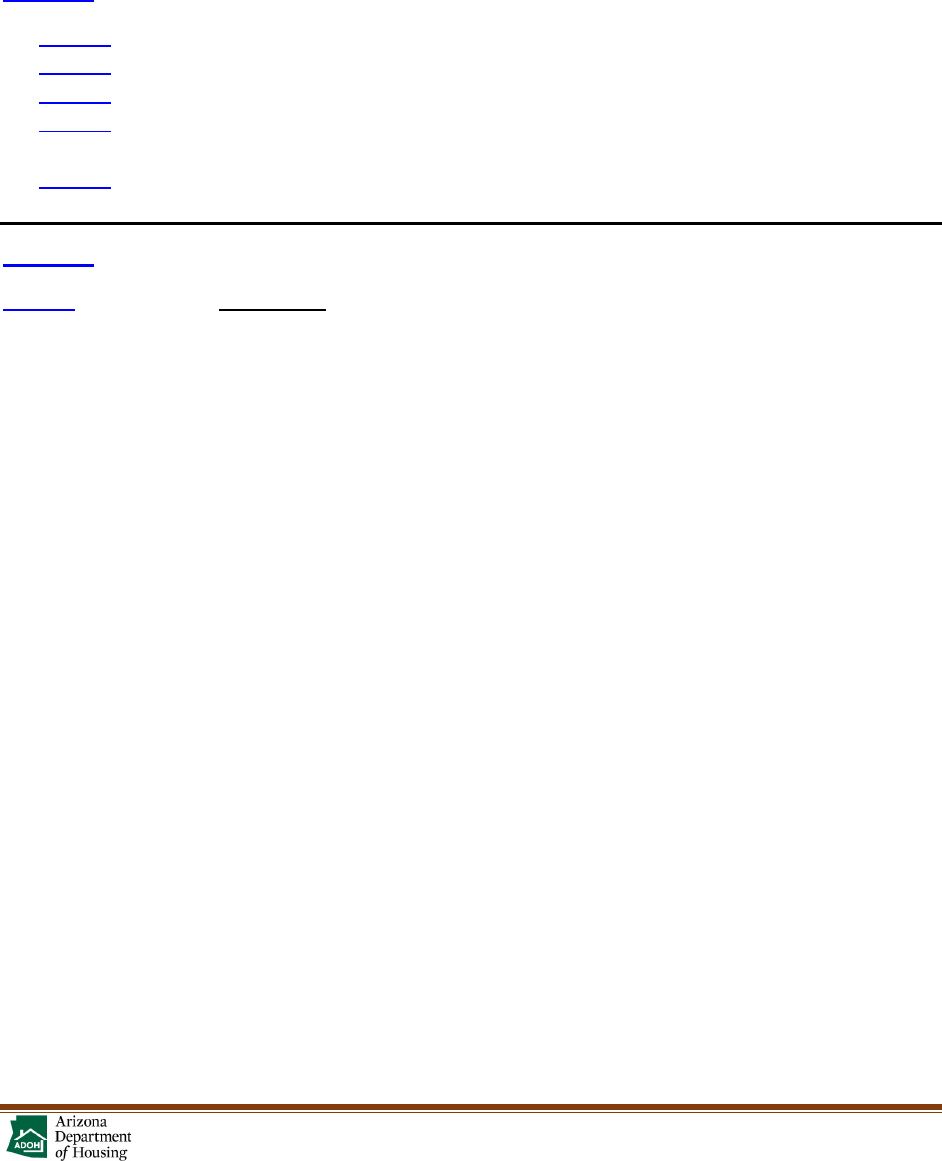
Arizona Residential Landlord and Tenant Act An Arizona Department of Housing Publication
Page 35
Arizona Revised Statute
Title 9 – Cities and Towns
Chapter 12 – Residential Rental Inspection Programs
Article 1 General Provisions
9-1301 Definitions
9-1302 Individual property inspections
9-1303 Material affect on health and safety of occupants
9-1304 Adoption of citywide residential rental property licensing, registration or
inspection program; requirements
9-1305 Inspection fees; penalties
Article 1 General Provisions
9-1301 Definitions
In this chapter, unless the context otherwise requires:
1. "Building code" means the construction codes that were in force at time of building
construction, including plumbing and mechanical codes, electric codes, residential
construction codes, energy conservation codes and existing building construction codes,
and includes any property maintenance codes, neighborhood preservation codes, anti-blight
codes or other similar codes, however denominated. With respect to mobile homes as
defined in section 33-1409, building code means the federal construction codes applicable
to homes constructed after June 15, 1976, and the Arizona codes applicable to homes
constructed before that date.
2. "Citywide residential rental property inspection program" means any program that
includes systematic or periodic inspections of a majority of rental properties in the city that
have not previously been found to meet the requirements of section 9-1302.
3. "Exterior inspection" means the visual inspection of any portion of a residential dwelling
unit that can be seen from a public street or other right-of-way, or that can be seen from an
adjacent property if a complaint or consent is received from the adjacent property owner,
lawful resident or lawful tenant.
4. "Initial inspection" means the first inspection of a residential rental dwelling unit after the
establishment by ordinance or resolution of a residential rental inspection program.
5. "Interior inspection" means a physical or visual inspection of the interior of a residential
rental dwelling unit and other portions of a residential rental dwelling unit that are not visible
from a public street, right-of-way or neighboring property that is made for the purpose of
looking for building code violations.
6. "Mobile home park" has the same meaning as prescribed in section 33-1409.
7. "Multifamily housing" means site built buildings containing residential dwelling units, but
does not include mobile home parks.
8. "Owner" means the person, corporation, limited liability company, partnership, limited
partnership, trust or real estate investment trust shown on the lawfully recorded title to the
property.

Arizona Residential Landlord and Tenant Act An Arizona Department of Housing Publication
Page 36
9. "Residential dwelling unit" means a building or structure or part of a building or structure
that is used for a home or residence by one or more persons who maintain a household. It
also means a mobile home regardless of ownership of the land.
10. "Residential rental dwelling unit" means a dwelling unit that is leased or rented to one or
more tenants. A dwelling unit that is occupied in part by the owner of the dwelling unit is not
a residential rental dwelling unit unless a tenant occupies a part of the dwelling unit that has
its own cooking and sleeping areas, a bathroom and a separate entrance, unless otherwise
provided in a zoning ordinance of the city or town. Residential rental dwelling unit does not
include an owner occupied mobile home in a mobile home park that is not owned by the
landlord of the mobile home park.
11. "Residential rental licensing requirement" means a requirement established by a city or
town that property owners or property managers obtain a license or permit from the city or
town, with or without an associated fee, before they can legally engage in the rental of
dwelling units in the city or town.
12. "Residential rental registration requirement" means any requirement established by a
city or town for rental housing owners or managers to submit information to the city or town
as already required to be submitted to the county assessor under section 33-1902.
9-1302
Individual property inspections
A. For individual residential rental properties the city or town may conduct interior
inspections if an exterior inspection of the property reveals or if the property is found to have
any of the following:
1. Conditions that materially affect the health and safety of the occupants as prescribed by
section 9-1303.
2. A significant level of crime associated with the property.
3. A documented history of building code violations.
4. The owner repeatedly fails to comply with building code enforcement requirements
imposed by the city or town.
5. There is probable cause that the residential rental property is not in compliance with the
city's building code.
6. A complaint is received from or consent for inspection is given by the owner of record,
agent or property manager, a lawful resident or a lawful tenant of the residential rental unit.
B. If the city or town determines pursuant to subsection A of this section that an interior
inspection is reasonably necessary and the property's tenant has vacated, the city or town
may require an additional inspection and approval by the city or town before a new
occupancy is permitted.
C. Before entry the city or town shall receive consent of the owner of record or a lawful
tenant or on issuance of a warrant.
D. This section does not limit the authority of a city or town to:
1. Perform an exterior inspection of any property in the city or town's jurisdiction at any time.
2. On receipt of a complaint or consent from the owner or lawful tenant, perform an interior
inspection of any property in the city or town's jurisdiction.
3. Perform interior, exterior or construction job site inspections of new construction before
issuance of a certificate of occupancy.

Arizona Residential Landlord and Tenant Act An Arizona Department of Housing Publication
Page 37
4. Perform interior or exterior inspections of illegal construction that occurred without a
required building permit.
5. Perform an interior inspection of any property during an emergency or natural disaster.
E. A city or town may designate any of its departments to perform all or part of the duties
granted to the city or town pursuant to this chapter.
9-1303 Material affect on health and safety of occupants
For the purposes of this chapter, a condition that materially affects the health and safety of
the occupants of a residential rental dwelling unit includes any of the following conditions:
1. Inadequate sanitation, ventilation or space requirements, including the following:
(a) Lack of or inadequate water closets, lavatories, bathtubs or showers.
(b) Lack of a required kitchen sink or a kitchen sink that does not comply with the building
code of the city or town in which the property is located.
(c) Lack of hot and cold running water to plumbing fixtures.
(d) Lack of adequate heating and cooling.
(e) Lack of or improper operation of required ventilating equipment or broken or missing
windows or doors that create a hazardous condition or a potential attraction to trespassers.
(f) Lack of minimum amounts of natural light and ventilation as required by the building
code.
(g) Inadequate room and space dimensions as required by the building code.
(h) Lack of required adequate electricity and lighting as required by the building code.
(i) Infestation of insects, vermin or rodents.
(j) Lack of connection to a sewage disposal system as required by the building code.
(k) Lack of adequate garbage and rubbish storage and removal facilities.
2. Structural hazards, including the following:
(a) Significantly deteriorated or inadequate foundations or foundation areas that are not
provided with adequate drainage.
(b) Flooring or floor supports of insufficient size to carry imposed loads with safety.
(c) Members of walls, partitions or other vertical supports that split, lean, list or buckle due
to defective material or deterioration.
(d) Members of ceilings, roofs, ceiling and roof supports or other horizontal members that
significantly sag, split or buckle due to defective material or deterioration.
(e) Fireplaces or chimneys that list, bulge or settle due to defective material or deterioration
or that are of insufficient size or strength to carry imposed loads with safety.
3. Hazardous wiring that does not conform with the building code or that has not been
maintained in good condition, or both, and that is not being used in a safe manner.
4. Hazardous plumbing that does not conform with the building code or that has not been
maintained in good condition, or both, and that is not free of cross-connections and
siphonage between fixtures.
5. Hazardous mechanical equipment including vents that do not conform with the building
code or that have not been maintained in good and safe condition and that are not working
properly.
6. Faulty weather protection that may include:
(a) Significantly deteriorated, crumbling or loose plaster.
(b) Deteriorated or ineffective waterproofing of exterior walls, roof, foundations or floors,
including broken windows or doors.

Arizona Residential Landlord and Tenant Act An Arizona Department of Housing Publication
Page 38
(c) Defective or lack of weather protection for exterior wall coverings, including lack of paint,
or weathering due to lack of paint or other approved protective covering.
(d) Broken, rotted, split or buckled exterior wall coverings or roof coverings.
7. Fire hazards or inadequate fire protection, including:
(a) Any building or portion of a building or any device, apparatus, equipment, combustible
waste or vegetation that is not in compliance with the building code and that is in such a
condition as to cause a fire or explosion or to provide a ready fuel to augment the spread
and intensity of a fire or explosion arising from any cause.
(b) Any building or portion of a building that is not provided with fire-resistive construction or
fire extinguishing systems or equipment required by the building code, except those
buildings or portions of buildings that conformed with all applicable building code laws and
that have fire-resistive integrity and fire extinguishing systems or equipment that has been
adequately maintained and improved in relation to any increase in occupant load, alteration
or addition, or any change in occupancy.
(c) Lack of adequate fire detection systems as required by law.
8. Faulty materials or construction that is not specifically allowed or approved by the
building code or that has not been adequately maintained in good and safe condition.
9. Hazardous or unsanitary premises, including those premises on which an accumulation
of weeds, vegetation, refuse, dead organic matter, debris, garbage, offal, rat harborages,
stagnant water, combustible materials and similar materials or conditions constitute fire,
health or safety hazards.
10. Inadequate maintenance, including any building or portion of a building that is
determined to be an unsafe building in accordance with the building code.
11. Unhealthy conditions, including any condition as defined in the building code that results
in the failure to maintain minimum standards of sanitation, health or safety or that renders
air, food or drink unwholesome or detrimental to health.
12. Inadequate exits, including all buildings or portions of a building that are not provided
with adequate exit facilities as required by the building code and that have been adequately
maintained and increased in relation to any increase in occupant load, alteration or addition,
or any change in occupancy.
13. Improper occupancy, including all buildings or portions of a building that are occupied
for living, sleeping, cooking or dining purposes and that were not designed and permitted to
be used for such occupancies, or that are occupied in excess of the maximum occupancy
load allowed by any applicable provision of the building code or state law.
9-1304
Adoption of citywide residential rental property licensing, registration or
inspection program; requirements
A. A city or town may adopt a citywide residential rental property inspection program only if
the following occurs:
1. The city or town conducts a public hearing and adopts the rental property inspection
program ordinance or resolution at a regularly held city or town council meeting that occurs
at least thirty days after the public hearing.
2. The ordinance or resolution is adopted by at least a three-fourths vote of the entire
council.
3. The city or town notifies all owners of residential rental properties who are then currently
registered with the county assessor of the county in which the property is located.

Arizona Residential Landlord and Tenant Act An Arizona Department of Housing Publication
Page 39
4. The notice to owners is mailed by first class mail at least twenty days in advance of the
required public hearing.
5. A notice of the public hearing is published in a local newspaper of general circulation and
any official municipal web site not less than two weeks before the required public hearing.
B. A city or town shall not adopt a residential rental licensing requirement for residential
rental properties or property owners. This subsection does not prohibit a city or town that
imposes a sales tax on rent from requiring a transaction privilege tax license for residential
rental property owners.
C. A city or town shall not adopt a residential rental registration requirement. A city or town
shall obtain rental registration information only from the county assessor's office for the
county in which the residential rental property is located.
9-1305
Inspection fees; penalties
A. A city or town shall not charge a fee for nonpermit related initial exterior inspections,
initial interior inspections that are requested by an owner of record or a lawful tenant, for
initial interior inspections pursuant to issuance of a warrant, initial annual inspection
pursuant to a residential rental inspection program or for an initial follow-up inspection
where all building code violations identified to the property owner with a written notice or
citation have been corrected.
B. A city or town may charge a reasonable fee:
1. For each subsequent follow-up interior or exterior inspection to ensure compliance with a
citation or notice issued for violations of the building code that materially affect the health
and safety of residents.
2. If an owner fails to correct a violation for which a notice or citation has been issued and
the owner has been given adequate time to correct the violation. For the purposes of this
paragraph, adequate time shall be no less than fifteen calendar days. For the purpose of
this section, a reasonable fee may include the costs incurred by the city or town for all
related inspections prior to the failure of the owner to correct identified violations.
C. Notwithstanding subsection B, a violation of the building code that immediately threatens
the health and safety of occupants shall be cited and repaired immediately.
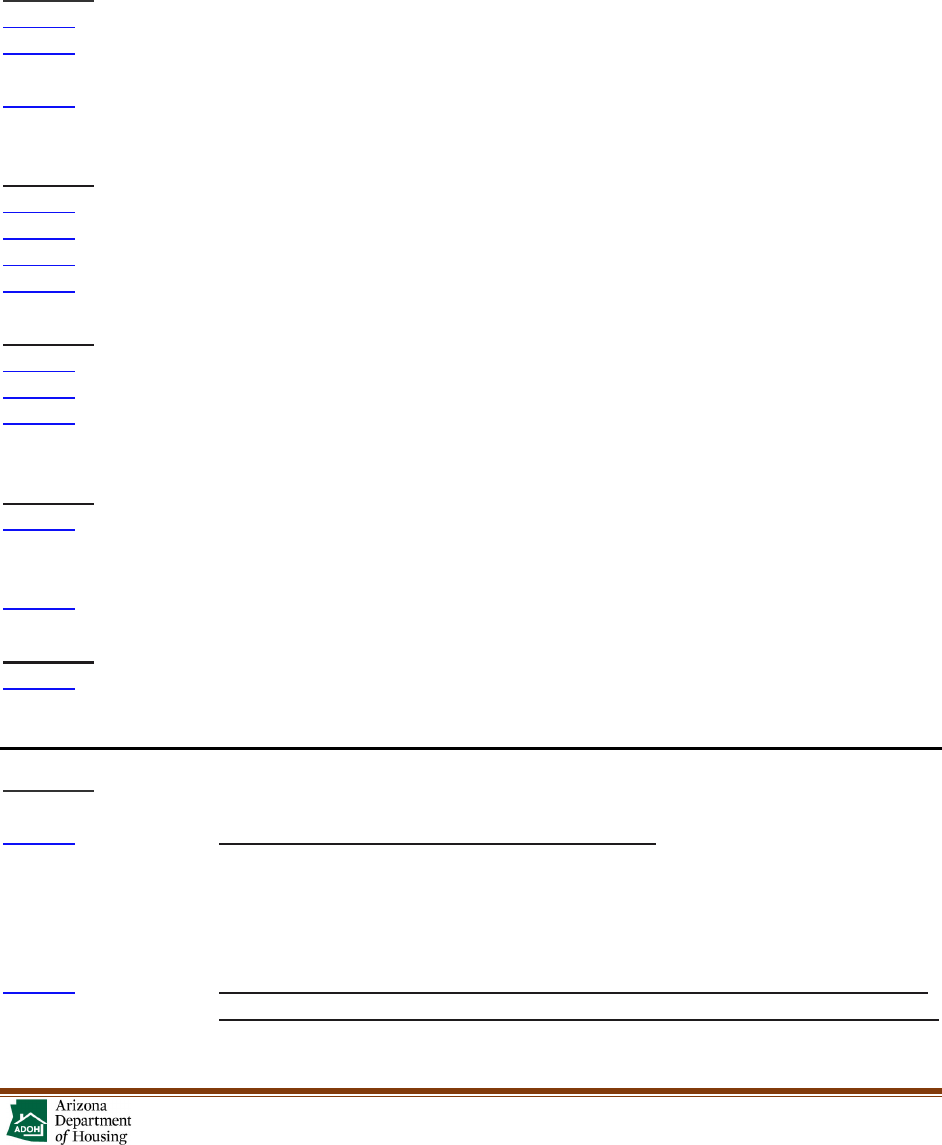
Arizona Residential Landlord and Tenant Act An Arizona Department of Housing Publication
Page 40
Arizona Revised Statute
Title 33 – Property
Chapter 3 – Landlord and Tenant
Article 1 Obligations and Liabilities of Landlord
33-301 Posting of lien law and rates by innkeepers
33-302 Maintenance of fireproof safe by innkeeper for deposit of valuables by
guests; limitations on liability of innkeeper for loss of property of guests
33-303 Discrimination by landlord or lessor against tenant with children
prohibited; classification; exceptions
Article 2
Obligations and Liabilities of Tenant
33-321 Maintenance of premises
33-322 Damage to premises; classification
33-323 Liability of person in possession of land for rent due thereon
33-324 Denial of landlord's title by lessee in possession prohibited
Article 3
Termination of Tenancies
33-341 Termination of tenancies
33-342 Effect of lessee holding over
33-343 Premises rendered untenantable without fault of lessee; nonliability of
tenant for rent; right to quit premises
Article 4
Remedies of Landlord
33-361 Violation of lease by tenant; right of landlord to reenter; summary
action for recovery of premises; appeal; lien for unpaid rent;
enforcement; notice and pleading requirements
33-362 Landlord's lien for rent
Article 5
Applicability of Chapter
33-381 Limitation
Article 1 Obligations and Liabilities of Landlord
33-301
Posting of lien law and rates by innkeepers
Every keeper of a hotel, inn, boarding, lodging or apartment house, or auto camp, shall post in a
conspicuous place in the office or public room, and in every bedroom of the establishment, a printed
copy of sections 33-951 and 33-952, with a printed statement of charges by the day, week or month
for meals, lodging or other items furnished.
33-302
Maintenance of fireproof safe by innkeeper for deposit of valuables by
guests; limitations on liability of innkeeper for loss of property of guests
A. An innkeeper who maintains a fireproof safe and gives notice by posting in a
conspicuous place in the office or in the room of each guest that money, jewelry, documents

Arizona Residential Landlord and Tenant Act An Arizona Department of Housing Publication
Page 41
and other articles of small size and unusual value may be deposited in the safe, is not liable
for loss of or injury to any such article not deposited in the safe, which is not the result of his
own act.
B. An innkeeper may refuse to receive for deposit from a guest articles exceeding a total
value of five hundred dollars, and unless otherwise agreed to in writing shall not be liable in
an amount in excess of five hundred dollars for loss of or damage to property deposited by
a guest in such safe unless the loss or damage is the result of the fault or negligence of the
innkeeper.
C. The innkeeper shall not be liable for loss of or damage to merchandise samples or
merchandise for sale displayed by a guest unless the guest gives prior written notice to the
innkeeper of having and displaying the merchandise or merchandise samples, and the
innkeeper acknowledges receipt of such notice, but in no event shall liability for such loss or
damage exceed five hundred dollars unless it results from the fault or negligence of the
innkeeper.
D. The liability of an innkeeper to a guest shall be limited to one hundred dollars for property
delivered to the innkeeper to be kept in a storeroom or baggage room and to seventy-five
dollars for property deposited in a parcel or checkroom.
E. For the purpose of this section the term "inn" includes hotel, boarding house, lodging
house, apartment house, motel and auto camp.
33-303
Discrimination by landlord or lessor against tenant with children
prohibited; classification; exceptions
A. A person who knowingly refuses to rent to any other person a place to be used for a
dwelling for the reason that the other person has a child or children, or who advertises in
connection with the rental a restriction against children, either by the display of a sign,
placard, written or printed notice, or by publication thereof in a newspaper of general
circulation, is guilty of a petty offense.
B. No person shall rent or lease his property to another in violation of a valid restrictive
covenant against the sale of such property to persons who have a child or children living
with them nor shall a person rent or lease his property to persons who have a child or
children living with them when his property lies within a subdivision which subdivision is
presently designed, advertised and used as an exclusive adult subdivision. A person who
knowingly rents or leases his property in violation of the provisions of this subsection is
guilty of a petty offense.
Article 2
Obligations and Liabilities of Tenant
33-321
Maintenance of premises
A tenant shall exercise diligence to maintain the premises in as good condition as when he
took possession, ordinary wear and tear excepted.
33-322
Damage to premises; classification
Removal or intentional and material alteration or damage of any part of a building, the
furnishings thereof, or any permanent fixture, by or at the instance of the tenant, without
written permission of the landlord or his agent, is a class 2 misdemeanor.
33-323
Liability of person in possession of land for rent due thereon

Arizona Residential Landlord and Tenant Act An Arizona Department of Housing Publication
Page 42
Every person in possession of land out of which rent is due is liable for the amount or
proportion of rent due from the lands in his possession, although it is only a part of the land
originally demised, without depriving the landlord of other legal remedies for recovery of
rent.
33-324
Denial of landlord's title by lessee in possession prohibited
When a person enters into possession of real property under a lease, he may not, while in
possession, deny the title of his landlord in an action brought upon the lease by the landlord
or a person claiming under him.
Article 3
Termination of Tenancies
33-341
Termination of tenancies
A. A tenancy from year to year terminates at the end of each year unless written permission
is given to remain for a longer period. The permission shall specify the time the tenant may
remain, and upon termination of such time the tenancy expires.
B. A lease from month to month may be terminated by the landlord giving at least ten days
notice thereof. In case of nonpayment of rent notice is not required.
C. A tenant from month to month shall give ten days notice, and a tenant on a semimonthly
basis shall give five days notice, of his intention to terminate possession of the premises.
Failure to give the notice renders the tenant liable for the rent for the ensuing ten days.
D. When a tenancy is for a certain period under verbal or written agreement, and the time
expires, the tenant shall surrender possession. Notice to quit or demand of possession is
not then necessary.
E. A tenant who holds possession of property against the will of the landlord, except as
provided in this section, shall not be considered a tenant at sufferance or at will.
33-342
Effect of lessee holding over
When a lessee holds over and retains possession after expiration of the term of the lease
without express contract with the owner, the holding over shall not operate to renew the
lease for the term of the former lease, but thereafter the tenancy is from month to month.
33-343
Premises rendered untenantable without fault of lessee; nonliability of
tenant for rent; right to quit premises
The lessee of a building which, without fault or neglect on the part of the lessee, is
destroyed or so injured by the elements or any other cause as to be untenantable or unfit
for occupancy, is not liable thereafter to pay rent to the lessor or owner unless expressly
provided by written agreement, and the lessee may thereupon quit and surrender
possession of the premises.
Article 4
Remedies of Landlord
33-361
Violation of lease by tenant; right of landlord to reenter; summary
action for recovery of premises; appeal; lien for unpaid rent;
enforcement; notice and pleading requirements

Arizona Residential Landlord and Tenant Act An Arizona Department of Housing Publication
Page 43
A. When a tenant neglects or refuses to pay rent when due and in arrears for five days, or
when a tenant violates any provision of the lease, the landlord or person to whom the rent is
due, or the agent of the landlord or person to whom the rent is due, may reenter and take
possession or, without formal demand or reentry, commence an action for recovery of
possession of the premises.
B. The action shall be commenced, conducted and governed as provided for actions for
forcible entry or detainer and shall be tried not less than five nor more than thirty days after
its commencement. In addition to determining the right to actual possession, the court may
assess damages, attorney fees and costs pursuant to section 12-1178.
C. If judgment is given for the plaintiff, the defendant, in order to perfect an appeal, shall file
a bond with the court in an amount fixed and approved by the court and payable to the clerk
of the superior court, conditioned that the appellant will prosecute the appeal to effect and
will pay the rental value of the premises pending the appeal and all damages, attorney fees,
costs and rent adjudged against the appellant.
D. If the tenant refuses or fails to pay rent owing and due, the landlord shall have a lien on
and may seize as much personal property of the tenant located on the premises and not
exempted by law as is necessary to secure payment of the rent. If the rent is not paid and
satisfied within sixty days after seizure as provided for in this section, the landlord may sell
the seized personal property in the manner provided by section 33-1023.
E. When premises are sublet or the lease is assigned, the landlord shall have a like lien
against the sublessee or assignee as the landlord has against the tenant and may enforce it
in the same manner.
F. Notwithstanding any other law, an agency of this state and an individual court may not
adopt or enforce a rule or policy that requires a mandatory or technical form for providing
notice or for pleadings in an action for forcible entry or forcible or special detainer. The form
of any notice or pleading that meets statutory requirements for content and formatting of a
notice or pleading is sufficient to provide notice and to pursue an action for forcible entry or
forcible or special detainer.
33-362
Landlord's lien for rent
A. The landlord shall have a lien on all property of his tenant not exempt by law, placed
upon or used on the leased premises, until the rent is paid. The lien shall not secure the
payment of rent accruing after the death or bankruptcy of the lessee, or after an assignment
for the benefit of the lessee's creditors.
B. The landlord may seize for rent any personal property of his tenant found on the
premises, but the property of any other person, although found on the premises, shall not
be liable therefor. If the tenant fails to allow the landlord to take possession of such
property, the landlord may reduce the property to possession by an action to recover
possession, and may hold or sell the property for the payment of the rent.
C. The landlord shall have a lien for rent upon crops grown or growing upon the leased
premises, whether the rent is payable in money, articles of property or products of the
premises, and also for the faithful performance of the terms of the lease, and the lien shall
continue for a period of six months after expiration of the term of the lease.
D. When premises are sublet, or when the lease is assigned, the landlord shall have the
same lien against the sublessee or assignee as he has against the tenant and may enforce
the lien in like manner.

Arizona Residential Landlord and Tenant Act An Arizona Department of Housing Publication
Page 44
Article 5 Applicability of Chapter
33-381
Limitation
This chapter shall apply to all landlord-tenant relationships except for landlord-tenant
relationships arising out of the rental of dwelling units which shall be governed by chapter
10 or 11 of this title.
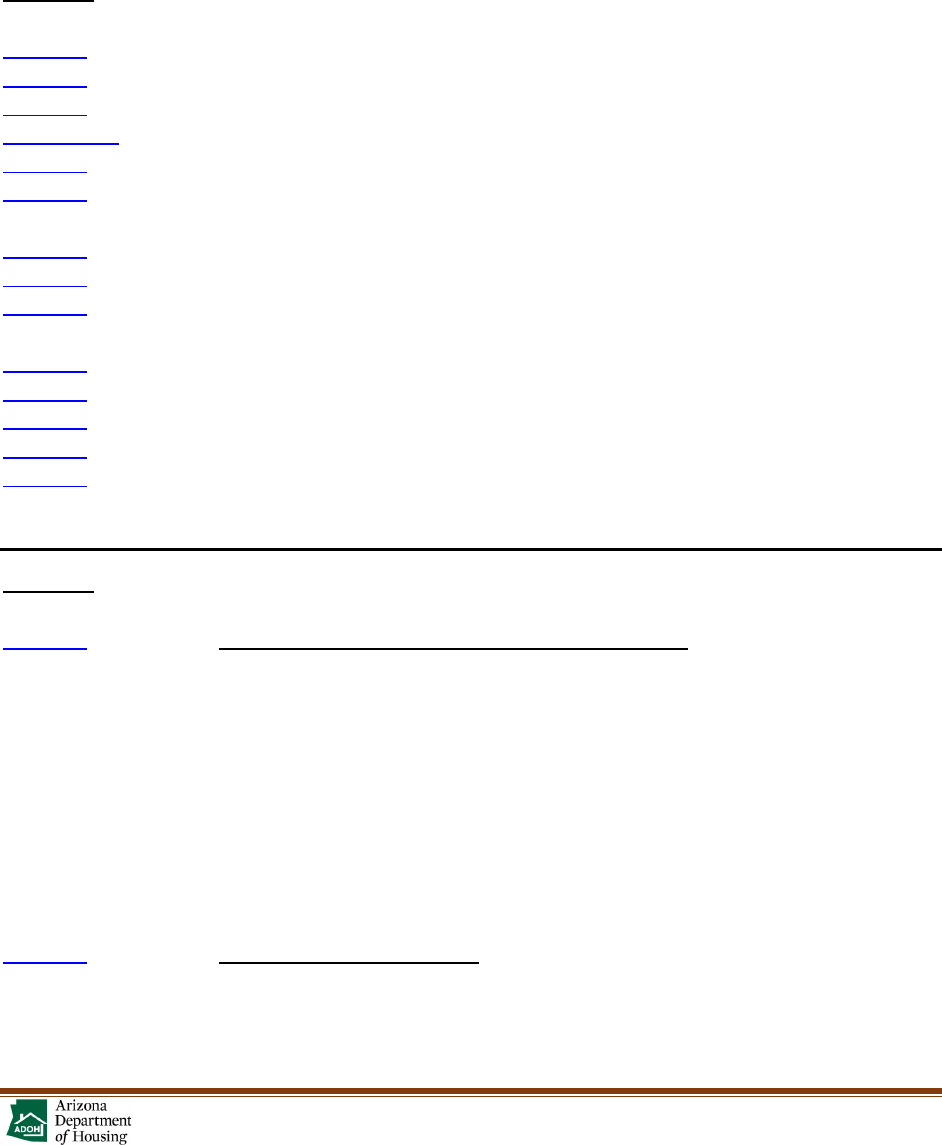
Arizona Residential Landlord and Tenant Act An Arizona Department of Housing Publication
Page 45
Arizona Revised Statute
Title 12 – Courts and Civil Proceedings
Chapter 8 – Special Actions and Proceedings Relating to Property
Article 4
Forcible Entry and Detainer
12-1171
Acts which constitute forcible entry or detainer
12-1172 Definition of forcible entry
12-1173 Definition of forcible detainer; substitution of parties
12-1173.01 Additional definition of forcible detainer
12-1174 Immateriality of time possession obtained by tenant
12-1175 Complaint and answer; service and return; notice and pleading
requirements
12-1176 Demand for jury; trial procedure
12-1177 Trial and issue; postponement of trial
12-1178 Judgment; writ of restitution; limitation on issuance; criminal violation;
notice
12-1179 Appeal to superior court; notice; bond
12-1180 Stay of proceedings on judgment; record on appeal
12-1181 Trial and judgment on appeal; writ of restitution
12-1182 Appeal to supreme court; stay and bond
12-1183 Proceedings no bar to certain actions
Article 4 Forcible Entry and Detainer
12-1171 Acts which constitute forcible entry or detainer
A person is guilty of forcible entry and detainer, or of forcible detainer, as the case may be,
if he:
1. Makes an entry into any lands, tenements or other real property, except in cases where
entry is given by law.
2. Makes such an entry by force.
3. Wilfully and without force holds over any lands, tenements or other real property after
termination of the time for which such lands, tenements or other real property were let to
him or to the person under whom he claims, after demand made in writing for the
possession thereof by the person entitled to such possession.
12-1172
Definition of forcible entry
A "forcible entry," or an entry where entry is not given by law within the meaning of this
article, is:
1. An entry without the consent of the person having the actual possession.

Arizona Residential Landlord and Tenant Act An Arizona Department of Housing Publication
Page 46
2. As to a landlord, an entry upon the possession of his tenant at will or by sufferance,
whether with or without the tenant's consent.
12-1173
Definition of forcible detainer; substitution of parties
There is a forcible detainer if:
1. A tenant at will or by sufferance or a tenant from month to month or a lesser period
whose tenancy has been terminated retains possession after his tenancy has been
terminated or after he receives written demand of possession by the landlord.
2. The tenant of a person who has made a forcible entry refuses for five days after written
demand to give possession to the person upon whose possession the forcible entry was
made.
3. A person who has made a forcible entry upon the possession of one who acquired such
possession by forcible entry refuses for five days after written demand to give possession to
the person upon whose possession the first forcible entry was made.
4. A person who has made a forcible entry upon the possession of a tenant for a term
refuses to deliver possession to the landlord for five days after written demand, after the
term expires. If the term expires while a writ of forcible entry applied for by the tenant is
pending, the landlord may, at his own cost and for his own benefit, prosecute it in the name
of the tenant.
12-1173.01
Additional definition of forcible detainer
A. In addition to other persons enumerated in this article, a person in any of the following
cases who retains possession of any land, tenements or other real property after he
receives written demand of possession may be removed through an action for forcible
detainer filed with the clerk of the superior court in accordance with this article:
1. If the property has been sold through the foreclosure of a mortgage, deed of trust or
contract for conveyance of real property pursuant to title 33, chapter 6, article 2.
2. If the property has been sold through a trustee's sale under a deed of trust pursuant to
title 33, chapter 6.1.
3. If the property has been forfeited through a contract for conveyance of real property
pursuant to title 33, chapter 6, article 3.
4. If the property has been sold by virtue of an execution and the title has been duly
transferred.
5. If the property has been sold by the owner and the title has been duly transferred.
B. The remedies provided by this section do not affect the rights of persons in possession
under a lease or other possessory right which is superior to the interest sold, forfeited or
executed upon.
C. The remedies provided by this section are in addition to and do not preclude any other
remedy granted by law.
12-1174
Immateriality of time possession obtained by tenant
It is not material whether a tenant received possession from his landlord or became his
tenant after obtaining possession.

Arizona Residential Landlord and Tenant Act An Arizona Department of Housing Publication
Page 47
12-1175 Complaint and answer; service and return; notice and pleading
requirements
A. When a party aggrieved files a complaint of forcible entry or forcible detainer, in writing
and under oath, with the clerk of the superior court or a justice of the peace, summons
shall issue no later than the next judicial day.
B. The complaint shall contain a description of the premises of which possession is claimed
in sufficient detail to identify them and shall also state the facts that entitle the plaintiff to
possession and authorize the action.
C. The summons shall be served at least two days before the return day, and return made
thereof on the day assigned for trial.
D. Notwithstanding any other law, an agency of this state and an individual court may not
adopt or enforce a rule or policy that requires a mandatory or technical form for providing
notice or for pleadings in an action for forcible entry or forcible or special detainer. The form
of any notice or pleading that meets statutory requirements for content and formatting of a
notice or pleading is sufficient to provide notice and to pursue an action for forcible entry or
forcible or special detainer.
12-1176
Demand for jury; trial procedure
A. If a jury trial is requested by the plaintiff, the court shall grant the request. If the
proceeding is in the superior court, the jury shall consist of eight persons, and if the
proceeding is in the justice court, the jury shall consist of six persons. The trial date shall be
no more than five judicial days after the aggrieved party files the complaint.
B. If the plaintiff does not request a jury, the defendant may do so on appearing and the
request shall be granted.
C. The action shall be docketed and tried as other civil actions.
12-1177
Trial and issue; postponement of trial
A. On the trial of an action of forcible entry or forcible detainer, the only issue shall be the
right of actual possession and the merits of title shall not be inquired into.
B. If a jury is demanded, it shall return a verdict of guilty or not guilty of the charge as stated
in the complaint. If a jury is not demanded the action shall be tried by the court.
C. For good cause shown, supported by affidavit, the trial may be postponed for a time not
to exceed three calendar days in a justice court or ten calendar days in the superior court.
12-1178
Judgment; writ of restitution; limitation on issuance; criminal violation;
notice
A. If the defendant is found guilty of forcible entry and detainer or forcible detainer, the court
shall give judgment for the plaintiff for restitution of the premises, for all charges stated in
the rental agreement and for damages, attorney fees, court and other costs and, at the
plaintiff's option, all rent found to be due and unpaid through the periodic rental period, as
described in section 33-1314, subsection C, as provided for in the rental agreement, and
shall grant a writ of restitution. The person designated by the judge to prepare the judgment
shall ensure that the defendant's social security number is not contained on the judgment.

Arizona Residential Landlord and Tenant Act An Arizona Department of Housing Publication
Page 48
B. If the defendant is found not guilty of forcible entry and detainer or forcible detainer,
judgment shall be given for the defendant against the plaintiff for damages, attorney fees
and court and other costs, and if it appears that the plaintiff has acquired possession of the
premises since commencement of the action, a writ of restitution shall issue in favor of the
defendant.
C. No writ of restitution shall issue until the expiration of five calendar days after the
rendition of judgment. The writ of restitution shall be enforced as promptly and expeditiously
as possible. The issuance or enforcement of a writ of restitution shall not be suspended,
delayed or otherwise affected by the filing of a motion to set aside or vacate the judgment or
similar motion unless a judge finds good cause.
D. A defendant who is lawfully served with a writ of restitution and who remains in or returns
to the dwelling unit, as defined in section 33-1310, or remains on or returns to the mobile
home space, as defined in section 33-1409, or the recreational vehicle space, as defined in
section 33-2102, without the express permission of the owner of the property or the person
with lawful control of the property commits criminal trespass in the third degree pursuant to
section 13-1502.
E. If the defendant is found guilty of forcible entry and detainer or forcible detainer, the court
shall give the defendant notice that a defendant who is lawfully served with a writ of
restitution and who remains in or returns to the dwelling unit or remains on or returns to the
mobile home space or the recreational vehicle space without the express permission of the
owner of the property or the person with lawful control of the property commits criminal
trespass in the third degree pursuant to section 13-1502.
12-1179 Appeal to superior court; notice; bond
A. Either party may appeal from a justice court to the superior court in the county in which
the judgment is given by giving notice as in other civil actions within five calendar days after
rendition of the judgment pursuant to this section. The appeal shall be filed in accordance
with this section, and the time to appeal shall not be extended or otherwise affected by the
filing of a motion to set aside or vacate the judgment or similar motion.
B. A party seeking to appeal a judgment shall file with the notice of appeal a bond for costs
on appeal. The justice of the peace shall set the bond in an amount sufficient to cover the
costs on appeal. The bond shall be payable to the clerk of the justice court. If a party is
unable to file a bond for costs on appeal, the party shall file with the justice court a notice of
appeal along with an affidavit stating that the party is unable to give bond for costs on
appeal and the reasons therefor. Within five court days after the filing of the affidavit, any
other party may file, in the justice court, objections to the affidavit. The justice of the peace
shall hold a hearing on the affidavit and objections within five court days thereafter. If the
justice court sustains the objections, the appellant shall file, within five court days thereafter,
a bond for costs on appeal as provided for in this section or in such lesser amount as
ordered by the justice court.
C. A party seeking to appeal a judgment may stay the execution of either the judgment for
possession or any judgment for money damages by filing a supersedeas bond. The justice
court shall hold a hearing on the motion within five court days after the parties advise the

Arizona Residential Landlord and Tenant Act An Arizona Department of Housing Publication
Page 49
justice court of their failure to stipulate on the amount of the bond. The stay is effective
when the supersedeas bond or bonds are filed.
D. The party seeking to stay the execution of the judgment for possession shall file a
supersedeas bond in the amount of rent accruing from the date of the judgment until the
next periodic rental date, together with costs and attorney fees, if any. The tenant shall pay
to the clerk of the justice court, on or before each periodic rental due date during the
pendency of the appeal, the amount of rent due under the terms of the lease or rental
agreement. Such amounts shall be made payable by the justice court to the owner, landlord
or agent as they accrue to satisfy the amount of periodic rent due under the lease or rental
agreement. In all cases where the rent due under the terms of the lease or rental agreement
is paid through the justice court as set forth in this subsection, the order of the court may
include a one-time handling fee in the amount of ten dollars to be paid by the party seeking
to stay the execution of the judgment for possession. In no event shall the amounts paid per
month exceed the amount of monthly rent charged by the owner for the premises. If the
tenant raises habitability as provided for in sections 33-1324 and 33-1364 as an affirmative
defense to the nonpayment of rent or the tenant has filed a counterclaim asserting a
habitability issue, the justice court shall retain all money paid under this subsection pending
a final judgment.
E. If during the pendency of the appeal the party seeking to stay the execution of the
judgment for possession fails to pay the rent on the periodic rental due date, the party in
whose favor a judgment for possession was issued may move the justice court to lift the
stay of the execution of the judgment for possession. The justice court shall hear the motion
to lift the stay of the execution of the judgment for possession and release accrued monies,
if any, within five court days from the failure of the party to pay the periodic rent due under
the terms of the lease or rental agreement. If the judgment appealed from involves a finding
of a material and irreparable breach pursuant to section 33-1368 or section 33-1476,
subsection D, paragraph 3 the justice court shall treat it as an emergency matter and
conduct a hearing on a motion to lift the stay of execution of the writ of restitution within
three days. If the third day is a Saturday, Sunday or other legal holiday, the hearing shall be
held on the next day thereafter.
F. The party seeking to stay the execution of the judgment for money damages shall file a
supersedeas bond in the amount of the judgment, together with costs and attorney fees, if
any. The amount of the bond shall be fixed by the court and payable to the clerk of the
justice court.
12-1180
Stay of proceedings on judgment; record on appeal
When the appeal bond is filed and approved, the justice of the peace shall stay further
proceedings on the judgment and immediately prepare a list of all entries on the justice's
docket in the action and transmit it, together with all the original papers, to the clerk of the
superior court of the county in which the trial was had.
12-1181
Trial and judgment on appeal; writ of restitution
A. On trial of the action in the superior court, appellee, if out of possession and the right of
possession is adjudged to him, shall be entitled to damages for withholding possession of

Arizona Residential Landlord and Tenant Act An Arizona Department of Housing Publication
Page 50
the premises during pendency of the appeal and the court shall also render judgment in
favor of appellee and against appellant and the sureties on his bond for damages proved
and costs.
B. The writ of restitution or execution shall be issued by the clerk of the superior court and
shall be executed by the sheriff or constable as in other actions.
12-1182
Appeal to supreme court; stay and bond
A. In a forcible entry or forcible detainer action originally commenced in the superior court,
an appeal may be taken to the supreme court as in other civil actions.
B. The appeal, if taken by the party in possession of the premises, shall not stay execution
of the judgment unless the superior court so orders, and appellant shall file a bond in an
amount fixed and approved by the court, conditioned that appellant will prosecute the
appeal to effect and will pay the rental value of the premises pending the appeal and all
damages, costs, and rent adjudged against him by the superior court or the supreme court.
12-1183
Proceedings no bar to certain actions
The proceedings under a forcible entry or forcible detainer shall not bar an action for
trespass, damages, waste, rent or mesne profits.
